PURPOSE LAB STUDENTS HEAR ABOUT CAREERS IN POLITICS
HOW BUSINESSES AND MPS ARE TEAMING UP TO BREAK BARRIERS AND TRANSFORM LIVES IN 2025



HOW ALL EMPLOYEE SHARE PLANS CAN EMPOWER WORKERS

PURPOSE LAB STUDENTS HEAR ABOUT CAREERS IN POLITICS
HOW BUSINESSES AND MPS ARE TEAMING UP TO BREAK BARRIERS AND TRANSFORM LIVES IN 2025



HOW ALL EMPLOYEE SHARE PLANS CAN EMPOWER WORKERS
All employee share plans have been helping workers save since the 80’s, with potential to evolve for a new UK workforce.
UK households with under £1k in savings1 11m three-year plan to put down a deposit. As a young working mum without the property ladder. The money came straight out of my wages each month so it was an easy way to save.”
Laura Beckett, for mer Lloyds Bank employee, West Worthing*
19,990 UK companies with
advantaged employee share schemes3
Average number of eligible employees who participate in SAYE2 <40%
Of Millenials think they won’t work at their company long enough to benefit from a Share Incentive Plan6 47%
Of share plan participants check their company’s share price monthly5 83%
with no real risk – my money is safe and, if the share price falls, I can get my
back, so it’s a great way to build a nest egg.”
Nigel Youds, Drax employee, Tunbridge Wells

Welcome to this special edition of the Breaking Down Barriers Magazine.
Risk is an ever-present force in politics, our financial system and our lives. But risk is often a strong and purposeful force as well as something to be understood and tamed. Without risk we have no triumph, no change, no achievement and in the right time and place, no excitement and certainly no growth.
Risk is omnipresent and whilst we can work hard to mitigate, change or transfer it, ultimately we are surrounded by it.
Not to take risk in an appropriate way is often the biggest risk of all. It’s a barrier to personal and professional growth and financial security.
To really engage with risk, people need to feel that they have agency in their choices and a stake in the outcome. If they can contribute, they can influence.
To enable growth of the UK economy requires a collective engagement with sensible and appropriate risk taking.
What does purposeful risk taking look like?
• For the market, this is to streamline and digitise, continuing to transform older ways of working and support the efficient allocation of capital.
• For investors this is to deploy capital for longer term returns, with deeper and more permanent investment.
• For companies this is to deploy capital to modernise their operations, invest in training and upskill their teams for the roles of tomorrow, and work closely with their communities where they can contribute.
• For employees this is to push their own boundaries to grow their technical and professional skills, and to invest in the mission and opportunity of their companies.
Later in this edition we provide an overview of the real value of employee share plans. They help workers at every level and stage of life improve their financial security, and can be genuinely transformative in helping real people achieve their goals.
Risk is an ever-present force in politics, our financial system and our lives.
A critical time where people are vulnerable and unable to manage risk is during bereavement and probate. We outline the evidence EQ provided to the Select Committee and the important role of the Death Notification Service, which greatly simplifies the burden of communicating a death to banks and insurance companies.


Anchor and Plentific celebrate their housing partnership
A lightbulb moment in the NHS’ staffing culture with NES
Purpose Coalition’s new initiative taps student talent by Rt Hon Anne Milton
Outstanding ESG performance award for Colt
How Lumo is empowering the North East
Will AI be the answer to rescuing health and social care?
By Dr Jonathan Shaw of System C
How all employee share plans can empower workers with Equiniti
How the Purpose Lab is shaping inclusive futures
E.ON’s role in sharping a fairer and greener UK
Women’s health in the workplace with Curtins
How businesses and MPs are breaking down barriers in 2025 by Nick Forbes CBE
E.ON is leading the charge in upward career mobility
A clear vision for supporting the NHS by Mat Pickering of Optegra Eye Health Care
Purpose Driven banking for a resilient future with Aldermore Bank
Starmer’s plan to tackle NHS backlogs
Reducing health inequalities within the NHS with EMS Healthcare
When you enjoy what you do, you keep doing it with Southeastern
The Purpose Lab will empower future leaders
Abbey Mumtaz’s Travelodge journey
Sam Bone’s Ramsay journey
Clyde & Co’s programme paves the way for social mobility in law
The Purpose Coalition’s 2024 in review by Mark Hulsmeier, Client Services Director
Sodexo and The Purpose Coalition partner to expand opportunities for prison-leavers
Widening participation to address skills shortages with GEDU
Why do some people think Reform UK will win the next election?
Universities as drivers of maritime innovation with Southampton Solent University
How Royal Holloway students shaped the university’s strategy
Chester Business School celebrates education awards win
James Asser MP visits Greenwich University
The University of Worcester’s action over words
Breaking down barriers to accountancy

GILL GERMAN MP:
My first six months serving my community
It’s safe to say that my first six months as the MP for Clwyd North has been quite a journey. My previous role as Deputy Leader and Cabinet Lead for Education, Children, and Families at Denbighshire County Council meant I was no stranger to the political world, but nothing can quite prepare you for life in the House of Commons.
Whether it be navigating the maze that is the Palace of Westminster, learning the ways of the House, or setting up a constituency office from scratch, getting to grips with this role stretches you like never before. Like in all challenging positions, it is important to try and build resilience to last the distance, but remembering this can be hard when you are keen to do the very best job you can for the constituency that has put its faith in you.
A former teacher, my route to becoming an MP came straight through my classroom and into local government, driven by the inequalities faced by children and families seen first-hand in both roles. My priorities as an MP reflect this. Addressing inequalities and breaking down barriers to opportunity continue to be drivers for my work. Listening to and supporting constituents and communities, speaking in the House on issues such as child poverty, and improving job opportunities alongside building relationships with organisations,
like the Purpose Coalition, that share my priorities have all formed part of my work so far. I intend to continue building on this work to bring forward the real change that people voted for.
As an MP, you learn quickly about the importance of a strong team around you. Starting up an MP’s office is not unlike starting a small business and you simply cannot do it alone. I was fortunate enough to secure an excellent Head of Office early in my tenure who has worked tirelessly to build the service and team that an MP’s office needs to best represent constituents, both at home and in the House. This relationship – along with that with the staff as a whole – is an important one. Politics really is a team sport and I’m so grateful for the time and energy put into building our team to serve the people of Clwyd North.
There has been so much to learn and there is so much still to learn, but I am enormously proud to be a part of the work of this new Government: to bring stability to our economy, rebuild our public services, and break down those barriers to opportunity that I saw so clearly on my journey to this place. It is an honour to represent the people of Clwyd North and I will continue to speak up and stand up for the people of our coastal towns, villages, and market towns in our special part of Wales.
A former teacher, my route to becoming an MP came straight through my classroom and into local government, driven by the inequalities faced by children and families seen first-hand in both roles.

Almost every week, cross-party MPs visit Purpose Coalition organisations across the country to meet their colleagues delivering for customers and the local communities they serve.
Take a look at the map to see some of our recent visits, and if you are interested in arranging for local MPs to visit your sites, please get in touch with Matthew McPherson >




MPs have become highly engaged in the Purpose Coalition's work to boost social mobility across the UK









In late October, Chancellor Rachel Reeves took to the Dispatch Box in the House of Commons to set out her first Budget as Chancellor of the Exchequer.
There has been much said about the Budget since, and it would be an underestimate to say the fall-out of the Budget has been tricky for the Chancellor – not least the controversial decisions the raise in National Insurance Contributions for employers, alongside changes to Inheritance Tax for farmers, which led to a widescale protests in Westminster by farmers.
Labour’s Budget was, however, an attempt to shift Britain’s course - like a train changing tracks - and has been compared with Geoffery Howe’s first Budgets during Margaret Thatcher’s reign, which were enormously unpopular. Despite that tricky start,
Thatcher went on to serve for 11 years as Prime Minister. Could it be that we are at maximum challenge for the government now, and that... things can only get better?
Rachel Reeves is betting the house on a long-term ‘pain now, gains tomorrow’ strategy, and whilst some of the headline announcements have been unpopular, there are specific elements of the Budget that appear to have landed far better with the public than you might think. According to the pollster YouGov, announcements such as the freezing of fuel duty, increasing the minimum wage, NHS and education spending, and the introduction of VAT on private schools have overwhelming public support.
capital spending on schools, including rebuilding 500 schools
the amount of National Insurance that employers have to pay on workers’ earnings
Increasing the cap on bus fares from £2 to £3 and extending it for a further year
Source: YouGov (https://yougov.co.uk/politics/articles/50843how-have-britons-reacted-to-labours-2024-budget
Since the election, the government has – as promised – gone ahead with many of the plans it committed to in its manifesto – from shaking up the planning system, pushing ahead with its plans to nationalise the railways, give workers more rights at work, create GB Energy, and more. But of course it and its supporters, want the government to do more.
In Westminster there won’t be a day that goes by without the Chancellor receiving a request from a backbench MP, charity, or other worthy cause to fund a project or programme that would likely make the country better – and over the last six months, the Chancellor will have had to learn to say no.
In Westminster there won’t be a day that goes by without the Chancellor receiving a request from a backbench MP, charity, or other worthy cause to fund a project or programme that would likely make the country better – and over the last six months, the Chancellor will have had to learn to say no.
Being in government is hard. After fourteen years in opposition, Labour MPs got used to demanding more money for their constituencies. The switch to government means the party must prioritise what it wants to deliver, and it won’t be able to deliver everything it wants to.
When Labour won a landslide election result on July 4th, the party ran on a one-word slogan – Change. Now in government, they need to deliver that change – and delivering in government is much harder than campaigning for it in opposition.
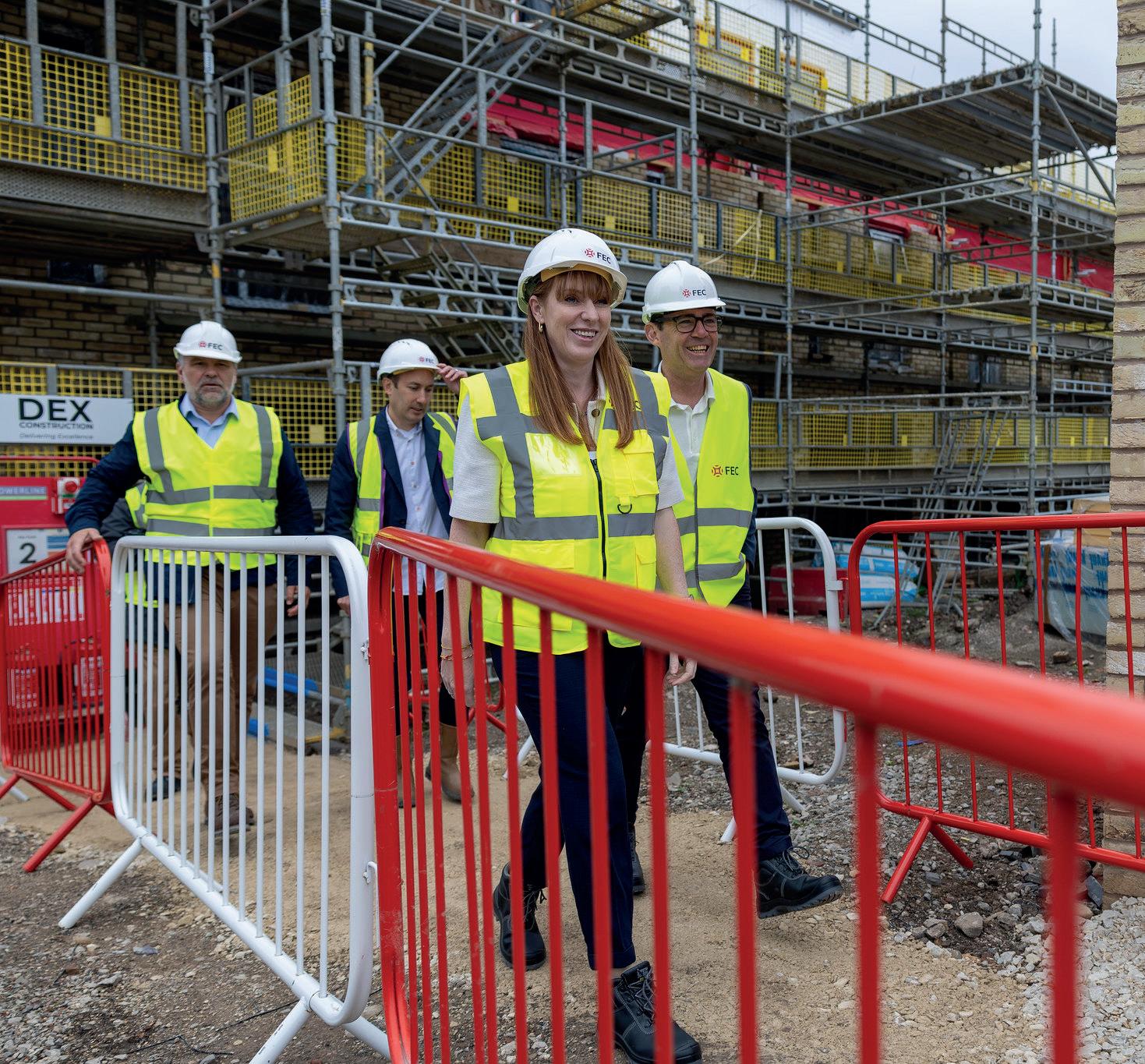
Housing has long been a contentious issue in British politics, with decades of debate over how to tackle the housing crisis.
However, under the new Labour government, building more homes has become an unequivocal priority. Deputy Prime Minister and Housing Secretary, Angela Rayner, recently announced sweeping reforms aimed at increasing housing supply, even proposing building on a portion of the green belt larger than Surrey. This bold move underscores the government’s recognition of the urgent need for action.
The reality is stark. The UK faces a chronic shortage of affordable and suitable housing. According to government estimates, the country needs to build at least 300,000 homes annually to meet demand, a target that has repeatedly been missed. Skyrocketing property prices and rents have left millions struggling to afford a place to live, pushing home ownership further out of reach for many.
This crisis is not just about housing numbers; it’s about building sustainable communities and aligns closely with the Purpose Coalition’s ‘Place: Building Sustainable Communities’ Purpose Goal. One of the most significant and controversial measures announced is the decision to allow building on parts of the green belt. Often viewed as sacrosanct, it comprises areas of undeveloped land around cities intended to prevent urban sprawl. However, many would argue that some of this land is neither environmentally valuable nor accessible to the public. By selectively building on such areas, the government hopes to unlock land for housing without sacrificing ecological integrity. Rayner’s plan includes offsetting any encroachment on the green belt with investments in biodiversity and green spaces elsewhere.
The government’s housing push is also a key economic strategy, aiming to deliver their Mission to achieve the ‘Highest growth in the G7’. The construction industry is a significant driver of economic growth, supporting jobs and local businesses. Building more homes could stimulate the economy, particularly in areas outside London and the South East, where investment is sorely needed.
One of the most significant and controversial measures announced is the decision to allow building on parts of the green belt. Often viewed as sacrosanct, it comprises areas of undeveloped land around cities intended to prevent urban sprawl.
Increased housing supply could help stabilise property prices and rents, making it easier for people to live near their places of work. This, in turn, could boost productivity and reduce the economic inefficiencies caused by long commutes and regional inequalities.
Despite the potential benefits, challenges remain. Building on the green belt is deeply unpopular in some quarters, particularly among suburban and rural communities. Local councils, which often have significant autonomy over planning decisions, may resist large-scale developments. Addressing these concerns will require careful negotiation and robust planning.
The current government’s willingness to take bold steps signals a turning point in UK housing policy. By prioritising housing and aligning efforts with broader sustainability goals, the government is tackling one of the root causes of economic barriers. If executed effectively, these reforms could reshape the housing landscape, providing millions with the security of a home and the foundation for a better quality of life.
Telford’s new MP – elected in July’s General Election – met over 50 Purpose Lab students to talk about his own social mobility journey to get into politics.
The event gave Purpose-lab students an opportunity to ask Shaun questions about Parliament, his ambitions as an MP, and discover how individuals from all walks of life can contribute to shaping the political landscape.
The Purpose Lab - part of the Purpose Coalition - is harnessing the potential of students from universities and colleges by giving them real world work experience in shaping responsible business strategies and social impact initiatives for some of the UK’s largest businesses.
Born and raised in Telford, Shaun described how his early experiences shaped his political vision and commitment to addressing inequality. His journey began at the local level, where he served as a councillor and later as leader of Telford and Wrekin Council, developing a deep understanding of the challenges facing the local community. In 2022, Shaun was elected as LGA Labour Group Leader, succeeding Nick Forbes to represent thousands of Councillors in Westminster, and was elected as the Member of Parliament for Telford in July 2024 – beating the incumbent Conservatives into third place.

In his reflections, Davies emphasized the importance of starting at the grassroots level, not only to build experience but also to connect deeply with the people and issues that matter most. He shared candid anecdotes about the lessons he learned along the way, including the resilience required to face setbacks and the determination needed to advocate for change.
A key theme of the event was the importance of breaking down the barriers that often deter people from pursuing political careers. Shaun encouraged students to see politics not as a distant or exclusive field but as an accessible and impactful way to serve their communities. “Politics needs voices from all backgrounds,” he said, highlighting the need for diversity and inclusivity in decision-making.
Feedback from attendees underscored the success of the event, with many students sharing how Davies’s words inspired them to consider careers in public service. His ability to connect with the audience and share practical advice resonated deeply, demonstrating the value of accessible and relatable political leaders.
The event underscored the importance of social mobility in politics, and engaging and mentoring the next generation of changemakers.
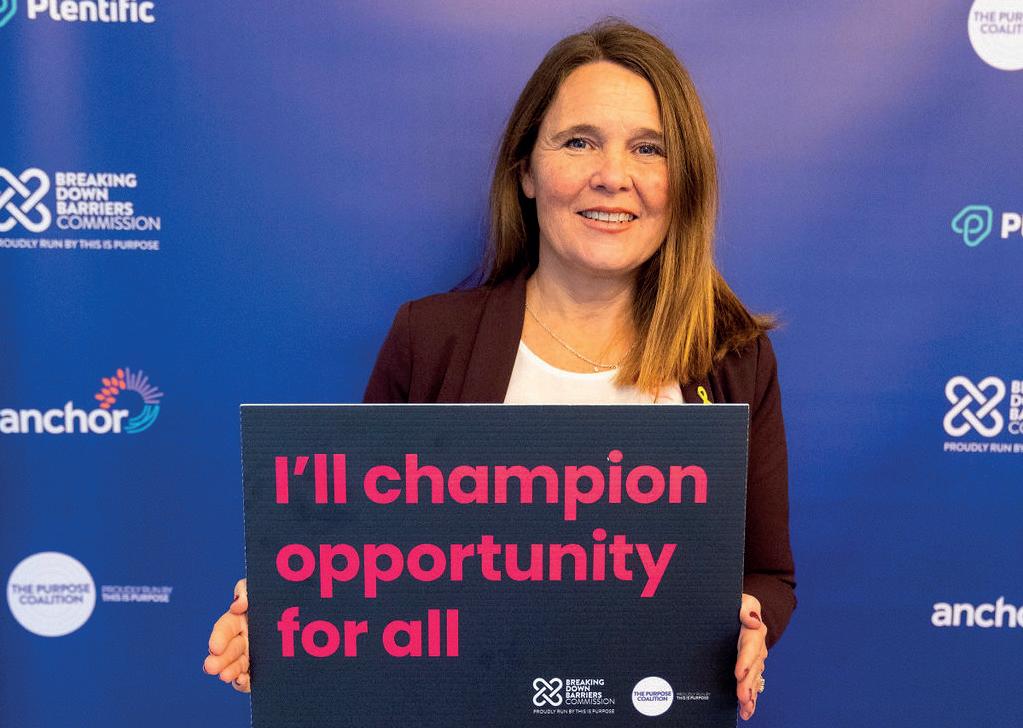
Members of Parliament from across the House of Commons have united in a commitment to become Opportunity for All Champions within their constituencies by endorsing the Purpose Coalition’s Social Scopes framework. The pledge represents a significant step in addressing social inequalities and promoting inclusive opportunities for all.
The Purpose Coalition’s Social Scopes offer a new approach to supporting organisations to clearly define, measure, and enhance their social impact. Modelled after the widely recognized Carbon Emissions Scope framework used in environmental sustainability, the Social Scopes translate that structured methodology into the realm of social equity. By leveraging this model, organisations can ensure they are contributing to positive change in the communities they serve.
The Social Scopes framework categorizes social impact into three key areas: Our People, focusing on the wellbeing and development of employees and stakeholders;
Our Supply Chain, ensuring that partners and suppliers align with ethical practices; and Our Community, emphasizing broader contributions to social mobility and tackling systemic inequalities. This tripartite approach enables a comprehensive, transparent evaluation of an organization’s role in fostering social equity and breaking down barriers to opportunity.
On December 9th, the Social Scopes were formally launched at an event in Parliament attended by over 200 members of the Purpose Coalition, including business leaders, policymakers, and activists. The event garnered wide-ranging political support, with several prominent MPs pledging to champion the initiative in their constituencies. Among those endorsing the Social Scopes are Clive Betts MP, Chair of the Housing, Communities, and Local Government Select Committee; Paul Davies MP (Colne Valley); Elaine Stewart MP (Ayr, Carrick, and Cumnock); Taiwo Owatemi MP (Coventry North West); Emily Darlington MP (Milton Keynes Central); Sharon Hodgson MP (Washington and Gateshead South); Alison Hume MP (Scarborough and Whitby); Charlotte Cane MP (Mid and South Cambridgeshire); Adam Dance MP (Yeovil); Sadik Al-Hassan MP (North Somerset); Rt Hon John Glen MP (Salisbury); and Manuella Pertegella MP (Stratford-on-Avon), among others.
MPs who sign up as Opportunity for All Champions commit to demonstrating leadership and collaboration in their constituencies. They will empower local organizations to adopt the Social Scopes framework and take meaningful steps toward addressing socio-economic disparities. To support MPs in this role, the Purpose Coalition provides an MP Toolkit. This resource includes a template letter for engaging local businesses, guidance on introducing the Social Scopes, and detailed information on measuring and tracking progress in social mobility outcomes.
This initiative reflects a growing recognition of the need for targeted, actionable strategies to create a fairer society. By aligning political, business, and community efforts, the Social Scopes framework aims to drive systemic change at the local level. MPs embracing this model demonstrate a commitment to building stronger, more equitable communities and ensuring that opportunities are accessible to everyone, regardless of background or circumstance.

Select Committees are one of the most important parts of Parliament – checking and reporting on the government’s work and coming up with new ideas for Britain. For organisations these are crucial bodies for next-level policy making.
In October, Parliament elected new Select Committee Chairs, and members of each Committee. This Parliament’s Committees are overwhelmingly made up of new MPs, so engagement will be vital to support their understanding of industry and the economy. Take a look at our handy new Committee guide, listing the Chairs and Members of some of Parliament’s key Committees.

Rt Hon Liam Byrne MP (Chair)
Antonia Bance MP
John Cooper MP
Sarah Edwards MP
Alison Griffiths MP
Sonia Kumar MP
Charlie Maynard MP
Gregor Poynton MP
Joshua Reynolds MP
Matt Western MP
Rosie Wrighting MP

Tan Deshi (Chair)
Calvin Bailey MP
Alex Baker MP
Lincoln Jopp MP
Emma Lewell Buck MP
Mike Martin MP t
Jesse Norman MP
Ian Roome MP
Michelle Scrogham MP
Fred Thomas MP
Derek Twigg MP

Layla Moran MP (Chair)
Danny Beales MP
Ben Coleman MP
Dr Beccy Cooper MP
Deirdre Costigan MP
Jen Craft MP
Josh Fenton-Glynn MP
Andrew George MP
Paulette Hamilton MP
Joe Robertson MP
Greg Stafford MP

Helen Hayes MP (Chair)
Jess Asato MP
Sureena Brackenridge MP
Dr Caroline Johnson MP
Amanda Martin MP
Darren Paffey MP
Manuela Perteghella MP
Mark Sewards MP
Patrick Spencer MP
Dr Marie Tidball MP
Caroline Voarden MP

Dame Meg Hillier MP (Chair)
Dame Harriett Baldwin MP
Rachel Blake MP
Chris Coghlan MP
Bobby Dean MP
Rt Hon John Glen MP
Dame Siobhain McDonagh MP
Lola McEvoy MP
Lucy Rigby MP
Dr Jeevun Sandher MP
Yuan Yang MP

Bill Esterson MP (Chair)
Polly Billington MP
Christopher Chope MP
Torcuil Crichton MP
Wera Hobhouse MP
Josh MacAlister MP
Anneliese Midgley MP
Julie Minns MP
Luke Murphy MP
Bradley Thomas MP
Claire Young MP

The Purpose Coalition landed at Labour Party Conference in 2024 with its Breaking Down Barriers Tent.
For the first time, the Coalition held its own events space at the Labour Party Conference, featuring over 23 events with 43 Parliamentarians and 100 speakers over the three days of the Conference.
At the flagship Breaking Down Barriers Reception, held in partnership with Sodexo UK&I in the Sodexo Live Lounge, Purpose Coalition Members heard directly from Minister of State for Skills and former Purpose Coalition Advisor Rt Hon Jacqui Smith, and former Timpsons boss and now Minister of State for Prisons James Timpson.
Panel events brought together Ministers, MPs and Select Commitee Chairs, with a wide range of topics including how AI can tackle health inequalities with Josh Simons MP; the importance of tracking socioeconomic diversity to break the class ceiling with Scottish Labour’s Shadow Finance Secretary Daniel Johnson MSP; how the railways can better deliver for customers and communities in the North with Transport Select Committee Chair Ruth Cadbury MP; and tackling the UKs skills shortage with Alex Ballinger MP and Cat Eccles MP.
The Coalition also held a number of events at the Conservative Party Conference, including an in-conversation with Young Enterprise Chief Executive Sharon Davies, and panels on the future of financial education, and connecting communities to opportunity.
Planning for Conference in 2025 is already well underway, when the Purpose Coalition will be returning with the Breaking Down Barriers Tent to Liverpool, alongside hosting events at the Liberal Democrat and Conservative Party Conferences.
2024 Conference
Partners included:
Sodexo UK&I
Allwyn
Lumo and Hull Trains
Hitachi Rail
Leonardo
Optegra
E.ON
NES Healthcare
Ramsay Health Care UK
Young Enterprise
Durham University
The Wise Group
University of Southampton
LGBT+ Labour
University of Salford
GEDU
Staffordshire University
Avanti West Coast
Capital City College Group
NCG College Group
Planning for Conference in 2025 is already underway.
Interested in hosting an event?
Get in touch with Karen Quinn by emailing Karen@thisispurpose.com

As a former cabinet member for education and proud SEND dad, I’m committed to supporting children with SEND and advocating for the changes needed to give them the best possible chances for their futures.
by Darren Paffey MP
Let’s be clear: we’ve seen significant progress over the last few years, and teachers are making herculean efforts to meet the needs of students, working incredibly hard under often challenging circumstances.
But more needs to be done. Since 2014, the number of children with an Education Health Care Plan (EHCP), who have been assessed by their local authority as having complex needs, has more than doubled. At the same time, academic attainment for children with special needs has not improved. These children cannot, should not – must not – be left behind.
The current national standards require trainee teachers to spend just one day of their placement in a SEND setting.
The last government did not do enough, so after 14 years of Tory neglect, it falls to this new Labour government to step up to the plate and get a serious plan to fix SEND. Far from being a peripheral issue, it is something that we simply must get right if this government is to achieve its mission of breaking down barriers to opportunity – barriers that too many SEND children face.
As campaigners and charities have been fighting for years, I won’t presume to suddenly have all the answers. There is no shortage of ideas for ministers to consider seriously – for example, those put forward before the election by charities such as Sense. But as a former teacher and MP for a constituency in which the number of children with SEND is outpacing the national average, I am determined to play my part in advocating for change.
One area where an overhaul is needed is in school inspections which, as things stand, simply do not do enough to recognise, reward or encourage good practice in SEND education. In my constituency, there are many teachers who are working incredibly hard to meet the needs of students with special educational needs. And yet those efforts – the adaptability and commitment to inclusivity among our teaching staff – are not sufficiently recognised as a measure of a school’s success by the current inspection framework.
That’s why our welcome Ofsted reforms should ensure that good inclusive SEND practices count towards and are recognised in the new report cards. This would provide a more comprehensive view of how schools are meeting the needs of SEND children and ensure that school staff are incentivised and encouraged through the inspection system to support their needs.
Inspections can encourage good practice, but can’t provide teachers with the tools and knowledge that underpin such practice in the first place. That’s why teacher training also needs to include a greater focus on SEND education. The current national standards require trainee teachers to spend just one day of their placement in a SEND setting.
This isn’t enough. That’s why I’m calling on the government to consider reviewing the original teacher training framework so that all new teachers receive sufficient training and on-the-job experience that equips them to support SEND children.
Money alone isn’t the answer – but it would be naïve to suggest that it isn’t at least part of what’s needed. Last month’s announcement of £1 billion in extra funding is a welcome and much-needed step. But if we’re to make the most of this investment, we need to make sure it supports both state-funded special schools and mainstream schools with inclusive practices, so that every child can get the support they deserve. We also need to address the significant strain that private SEND provision is putting on council budgets by ensuring they get their share of additional funding, as we cannot end up in a situation where councils are having to cut other services to address the financial strain this creates – through no fault of their own or their residents.
Improving SEND education will be a long process and there is no silver bullet. I am aware of the scale of the challenge – as are other families who have children with SEND. Change for these families is long overdue, and it’s my hope – and belief – that this government will deliver.
Darren Paffey is the Labour MP for Southampton Itchen, and supporter of the Purpose Coalition
How to engage?

Fighting a crucial marginal seat – one lost by Labour in 2019 –a ministerial office was probably the last thing on Kirsty McNeil’s mind on 4th July.
In the early hours of the next day, she was elected as the new MP for Midlothian, representing tens of thousands of constituents, and a few days later, was also thrown into a Ministerial role as a new Minister at the Scotland Office, becoming one of just five newly elected MPs to go straight into government.
Now, a few months in, she’s sharing her insights on how best to engage with government. Everyone wants a meeting with a Minister, and Kirsty has provided some candid, refreshing advice on how to ensure a meaningful conversation – rooted in accessibility, collaboration, and mutual respect.
From first principles, Kirsty is clear - “You are the expert”. Whether it’s an individual sharing their lived experience or an organisation providing insights into their work, she approaches each meeting with the assumption that there’s something valuable to learn.
McNeill was quick to point out that being an expert doesn’t require a fancy title or credentials – lived experience matters, and diverse voices are essential. “If you’re not used to seeing people who look or sound like you being treated as experts, that’s on us to sort out, not on you to try to ‘fit in,’” she said. It’s a reminder for all that often the best advocates can be those on the ground.
Another key point Kirsty emphasises is efficiency. If she’s taken the time to meet with someone, it’s because she already understands their relevance, saying “Please don’t feel you have to spend time selling [your cause] to me. If I’ve agreed to meet, I’m already sold.”. Instead, conversations should focus on the gaps in the Ministers’ knowledge—things they don’t know but need to.
It’s practical and honest advice for anyone preparing to meet with an MP or Minister: skip the preamble and dive straight into the substance.
Collaboration is another cornerstone of Kirsty’s advice. She envisions conversations not as exchanges of prepared talking points, but as creative problem-solving sessions. “Think of it as all of us sitting around a circular table, looking at the same information and issue,” she explains. While eager to collaborate in the moment, she admits she’s (and many Ministers) are also “wonks” at heart and appreciates being pointed toward key research, reports, or content to digest in her own time.
Engaging with Parliamentarians requires careful preparation, advice and support to make opportunities impactful and successful. It’s something every organisation needs to prepare for and maximise the value of.
Get in touch with the Purpose Coalition for more information and advice on engaging with Parliamentarians.
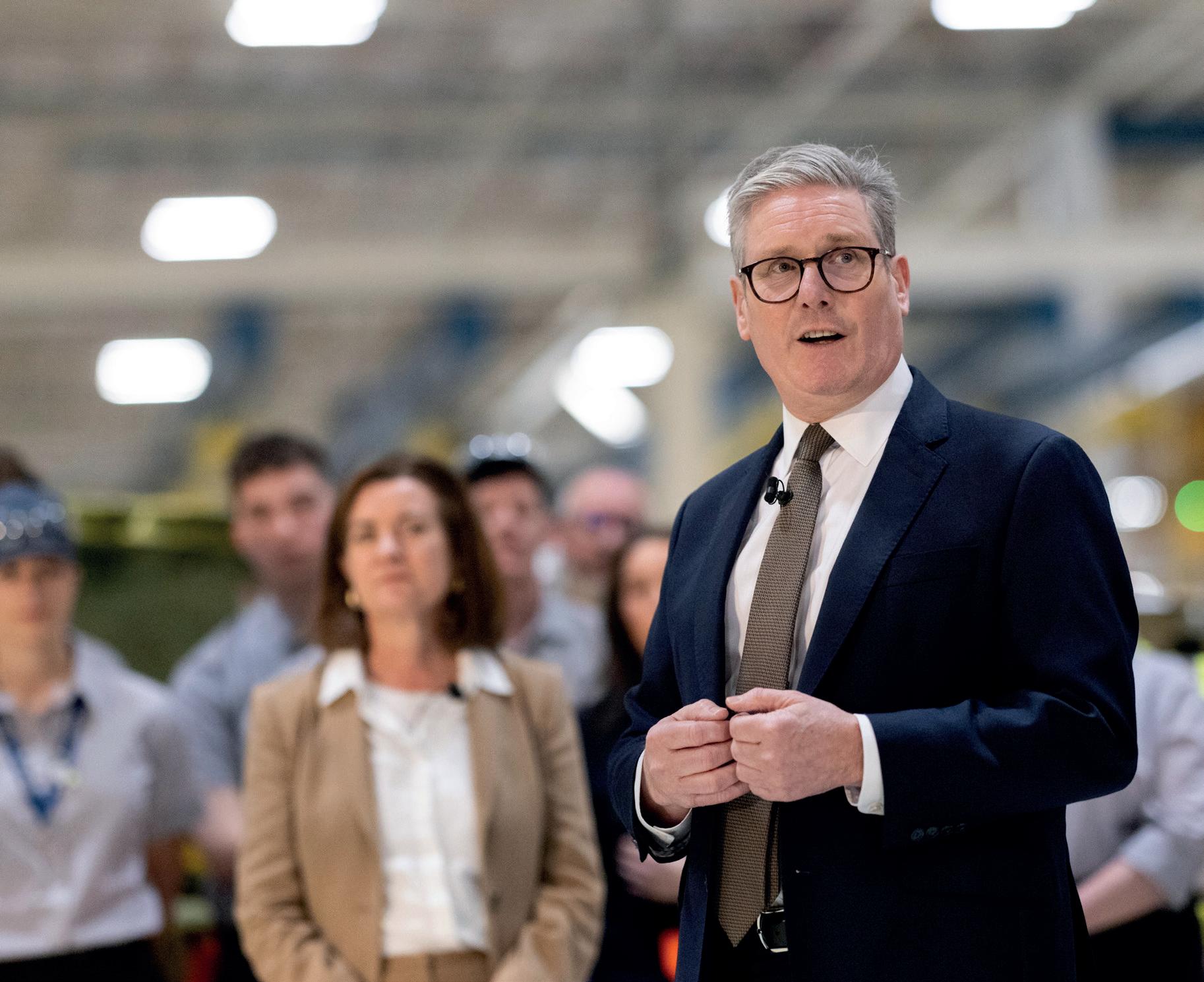
It was on a cold February morning in 2023 that Keir Starmer took to the stage in Manchester to announce his ‘Missions’ for government.

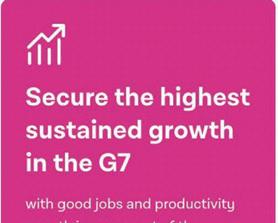




It was only the day before that then Prime Minister Rishi Sunak had announced his own ’five priorities’ for government, measurable targets of success or failure that voters could judge the government on. In the end, the government hit only two of its pledges, and voters dramatically punished the Conservatives at the ballot box in July.
Starmer’s Missions have since been a cornerstone of his election campaign, and now in government. Whilst some of the party’s pledges have been tweaked (the promise for the fastest growth in the G7 has been watered down to simply kickstarting economic growth), on the whole, they remain intact to what Starmer set out almost two years ago.
Prime Ministers love nothing more than a target. They focus the minds of Ministers and aim to corral the machine of government to work in a single direction and achieve a tangible aim – most clearly demonstrated by Boris Johnson’s government when setting COVID-19 testing targets in the summer of 2020.
Now, the Prime Minister has announced his own targets to sit above the Labour government’s Missions and aim towards the first step in long-term decision making to grow the economy and gradually improve public services.
For its growth Mission, the government has formally solidified its pledge to build 1.5m homes over the lifetime of the Parliament, a joint effort between Chancellor Rachel Reeves and Deputy Prime Minister Angela Rayner.



In education – part of the Breaking Down Barriers Mission – Starmer has promised to increase the proportion of five-year-olds ‘ready for school’ educationally and socially by 25% - from 60% to 75%.
In making the ‘NHS fit for the future’, the government has pledged to meet NHS targets of carrying out 92 per cent of routine operations and appointments within 18 weeks – something which has not been met for over a decade. And in energy, the government has pledged to reach 95% clean power by 2030 - a watering down from their previous commitment of 100% by the same date.
Most telling of all, however, is Starmer’s pledge on living standards. Throughout 2024, incumbent governments around the world were punished where living standards fell, and Starmer’s new Chief of Staff, Morgan McSweeney, is already looking closely about how the new government can avoid the same fate in three and a half years’ time.
As part of its economy pledge, the government says it will boost living standards throughout its term of office, increasing real household disposable income, which is projected to grow by just half a per cent a year over the parliament.
These targets will bring the government’s Missions to life in Whitehall. Whilst some will argue they are timid, Starmer will make the case that these are vital to ensure the government is focused on the long-term, and for its already nervous MPs, to win them their seats again at the next election.

The Liberal Democrats have constantly been the enigma of British politics – constantly vocal, sometimes influential, and always struggling to define their place in an electoral system dominated by Labour and the Conservatives.
On paper, the party’s 12% of the national vote at last year’s General Election might be considered a disappointment – but they increased their seat count from just 11 in 2019, to an astonishing 72 in 2024.
Swathes of southern England turned from blue to yellow, and the party not only won in places it had during the heights of Charles Kennedy’s leadership, but also took seats it had never won before, including in parts of true-blue Surrey and Cambridgeshire.
But as the dust settles, the question is – where the Liberal Democrats go from here?
For the Liberal Democrats, the next steps are crucial. Building a clearer identity, expanding their appeal beyond their traditional base, and finding ways to make themselves indispensable in the political conversation will be key to the party’s future success.
In 2024, the party focused on non-controversial national issues, coupled with strong local campaigns on fairer school funding, cleaning up Britain's rivers, and opposing planning reforms.
That strategy was effective in key battlegrounds, but it reveals a larger challenge for the party - a lack of a unifying national message. For Labour voters, the Liberal Democrats positioned themselves as a party to ‘kick out the Tories’, in places where Labour can’t win. Whilst for disillusioned traditional Conservative voters, the party provided a more palatable alternative to Labour, with softer positions on some issues – such as opposing the introduction of VAT on private schools.
In Parliament, the Liberal Democrats now matter again. With 72 MPs, the party is only 49 seats behind the Conservatives. They now hold crucial Select Committee Chair roles for core issues – Environment and Health, and the party has momentum and a spring in its step.
This lack of clarity, some insiders argue, is the party’s Achilles’ heel.
But when it comes to what’s next for the Liberal Democrats, polling by More in Common paints a stark picture. While many voters see the Lib Dems as a competent and trustworthy party, they remain unclear on what the party truly stands for. This lack of clarity, some insiders argue, is the party’s Achilles’ heel. “People know what Labour and the Conservatives are about,” one Lib Dem activist explained. “With us, it’s harder to pin down.”
The resurgence of Labour under Keir Starmer has squeezed the Liberal Democrats on the left, whilst in many seats they won in 2024, Conservative voters stayed at home. If these voters start to come out again, new Liberal Democrat MPs could be swamped at the next election.
For the Liberal Democrats, the next steps are crucial. Building a clearer identity, expanding their appeal beyond their traditional base, and finding ways to make themselves indispensable in the political conversation will be key to the party’s future success.
As the political landscape continues to evolve, the Lib Dems have an opportunity to shape their narrative. But to do so, they must decide what kind of party they want to be—and what they’re willing to fight for.

What gets measured gets done. It’s a mantra that drives our work at the Purpose Coalition to ensure that equality of opportunity is accessible to all, regardless of background or place.
And while many organisations across the country are working hard to address this most profound of social issues, it is still too often the case that there is no systematic measuring of the outcomes of those significant efforts.
Things start positively enough in our education system where vast amounts of information are available. Schools’ performance, pupil outcomes and attainment gaps are just some of the areas where a wealth of data exists. That data is also contextualised, so outcomes for pupils on Free School Meals, those with special education needs and those outside the mainstream school system in alternative provision can be closely and specifically tracked. As Education Secretary, I had access to all this crucial information which provided vital insights on who needed additional support and how my department’s efforts could best be targeted. Understanding how outcomes varied for different groups, particularly for the most disadvantaged children and young people in our society, was an integral part of developing effective policy to address education inequality gaps and get the most from the investment made.
In 2024, Britain spent over £60bn on the schools’ system alone. We also invest in Further and Higher Education, and in skills more broadly. This investment is crucial to developing our nation’s talent and to tackling the country’s skills crisis that is one of the biggest barriers to Britain’s sustained economic growth.
Yet after education, there is a huge gap in our understanding of what happens when all that talent passes into employment. What do we really know about the life outcomes for people after they leave the education system? We go from a feast of data and information to an almost total famine. We don’t know about the relative ease of people from different backgrounds getting into different careers. We know hardly anything about their progression – or lack of it - once in work. We also don’t know the contextualised position of employment outcomes for those like me, from working class backgrounds. There are occasional insights from one-off studies, for example on access to careers in particular sectors, but mostly our understanding of access to opportunity and progression in employment and careers is like a data black box. Outcomes are largely hidden from sight. There’s no real picture of the reality, or how it’s shifting over time.
That must change. We can’t improve equality of access to opportunity if we simply don’t know what’s happening on the ground. And that’s impossible if we’re not measuring social mobility and access to opportunity in employment. We need data and insights into what those journeys are like in practice for people wherever they are and on why we see those outcomes.
That is why The Purpose Coalition set itself the task of cracking the social mobility challenge, using data from employers of all sizes so that we have an ongoing measure of our progress on improving social mobility. This built on the crucial initial work of the Equality of Opportunity Coalition that I launched and led, with former Social Mobility Commission Co-Chair, Steven Cooper CBE.
We can’t improve equality of access to opportunity if we simply don’t know what’s happening on the ground. And that’s impossible if we’re not measuring social mobility and access to opportunity in employment.
Over the course of 2024, working with my co-chair Angela Halliday of Sodexo UK&I, we brought together employers from the private and public sector and from a range of different industry sectors across the Coalition and invaluable input from our Business Leadership Advisory Council.
As a result, we believe we have identified a groundbreaking new social mobility and social impact measurement standard - the Social Scopes measurement standard. It represents a new standard for simple and transparent employer social mobility reporting that is consistent and finally provides a way for employers of all sizes to show how they are driving social mobility inside and outside their organisations. It gives them a way to show what they are accomplishing on breaking down barriers more widely, for their colleagues, customers and communities.
Our approach uses a Scope 1, 2 and 3 framework, aligning social impact performance alongside climate impact – people and planet. It will show the holistic performance of a company and what it is doing internally and externally to drive better access to opportunity. Scope 1 is the socio-economic background tracking of employees; Scope 2 relates to an employer’s supply chain, ensuring their main suppliers also track socioeconomic background; Scope 3 relates to the external world of communities and customers and the organisation’s wider impact. It calculates a core social impact contribution by the business which can be compared to its net payroll cost - as the apprenticeship levy is - to give a sense of the effort relative to the size of the business. That gives us an overall picture of the state of the business and its social mobility footprint.
Employers can go further in understanding their outcomes by using the Purpose Goals framework as an Employee, Customer or Community Survey. These groups identifying which Goals are the biggest barriers to their progress is a groundbreaking way we can consistently and comparably identify the barriers to opportunity that different groups face. It can give us unique and real evidence and insights into what is driving the differing results of access to opportunity for people from different backgrounds.
If all employers use the Social Scopes, we can finally start understanding the variation of outcomes between and within sectors, what is happening in different parts of the country, the extent to which local opportunities are open to all and whether that is improving over time. We can use these insights to better tailor social mobility strategies inside businesses and outside in communities. We can then repeat the Social Scopes 1, 2 and 3 measures to see if they are moving in the right direction and assess whether barriers to opportunity are being broken down.
Employers can go further in understanding their outcomes by using the Purpose Goals framework as an Employee, Customer or Community Survey.
There is more work to do but the Social Scope 1, 2 and 3 measures are a vital first step in opening up the employer black box on access to opportunity and providing crucial insights that will finally allow us to shift the dial on creating a Britain with true equality of opportunity. If you want to find out more about how you can adopt the Social Scopes measurement standard and benefit from its insights both for your company and how it compares to others, then get in touch.

2024 was the year that inflation killed governments
Throughout last year over half the world’s population voted in national general elections. From the UK, which saw Keir Starmer win an overwhelming landslide victory to return his party to government for the first time in over fourteen years, to the USA where Donald Trump became only the second President to return to office.
In almost every major national election held in 2024 –the first post- COVID – incumbent parties have been kicked out or returned to power with a lower share of the vote for the first time since records began. There are some anomalies, including in Ireland and Mexico, but governments around the world will be thinking about how they can avoid the same fate.
Digging beyond the headline results – the rising cost of living has been the key reason why voters kicked out their incumbents. This was particularly the case in the USA, where voters punished Kamala Harris for sky-high inflation rates.
In the UK, Keir Starmer and Rachel Reeves will be looking closely at what happened in the USA and will want to think carefully about how to repeat what has happened across the Atlantica one-term administration.
As was said by former Shadow Chancellor and Education Secretary Ed Balls, taking action to address the cost of living in the UK is urgent. In October, the Office for Budget responsibility said that the UK is on track in this Parliament to have the second lowest standard of living increase of any Parliament since the Second World War. In fact, only the last Parliament (2019-2024) was lower.
The next general election is potentially only three and a half years away - and action takes time. If the economy does not start to grow more strongly and living standards rise, there is a risk this government becomes one-term like has happened to many across the world.
It is an issue that is already on the government’s radar – indeed, improving living standards is a key reason people voted for a Labour government. In the Budget, you can already see Starmer and Reeves taking action - from record rises in the Minimum and Living Wage, to investment in the health service, and avoiding Treasury plans to increase Fuel Duty - something that directly hits consumers in the pocket.
The political situation in Britain is volatile, as it is around the world. For a government elected on 34% of the national vote share, it is imperative that it starts to show – quickly – how it is improving people’s lives.
BY LORD WALNEY, FORMER LABOUR MP AND ADVISER TO PRIME MINISTER GORDON BROWN

Rehabilitation, opportunity, and the power of second
Giving equal access to opportunity means giving people a second chance. That’s true in most walks of life but it is particularly important for ex-offenders and those leaving our prison system.
It’s a chance that can not only transform individual lives but also improve communities and local economies. Across the UK, more than 11 million people hold a criminal record. Many of them will face significant barriers to finding employment, despite having the potential and drive to make a meaningful contribution to the workforce. With over one million job vacancies across the country, this untapped talent pool represents a key opportunity to address workforce challenges while driving social impact.
I saw firsthand how one particular employer has decided to step up and help individuals with criminal convictions to secure meaningful employment and rebuild their lives when I visited HMP Addiewell to see Sodexo’s Starting Fresh programme. Long-standing Purpose Coalition member Sodexo UK & Ireland, a leader in sustainable food services and valued experiences, has managed UK prisons for 30 years and currently operates six across the country. Addiewell is one of them, a modern prison housing and rehabilitating up to 700 men at any one time.
It’s known for its focus on providing education, training and employment opportunities to prisoners, both during their sentence and post-release.
For me, the visit provided an opportunity to witness the transformative power of education and training programmes. Prisoners shared stories of personal growth and preparation for life post-prison, highlighting the importance of such support systems. It also focused on the economic and social benefits of rehabilitation, not just for the individuals involved but for the broader community and local economy.
The Starting Fresh initiative aims to equip prisoners with the skills and support needed to reintegrate into society successfully. It also encourages more businesses to consider hiring individuals with criminal records and provides them with the proactive means to do so, including through recruitment events at prisons where employers can meet people close to their release date and learn more about the skills and qualifications they have gained during their time in prison. As part of the initiative, the Starting Fresh Employer Toolkit provides employers with resources and guidance on how to support ex-offenders, helping to reduce recidivism and promote inclusive employment practices. In 2024, Sodexo had already employed 96 people with disclosed criminal convictions, helping them to rebuild their lives.
Now an exciting and ambitious collaboration between The Purpose Coalition and Sodexo will see a new project, Starting Fresh with Purpose, which will amplify the programme’s reach by bringing together purpose-driven employers from across the wider Coalition.
They will work towards hiring ex-offenders and creating sustainable career pathways, ensuring greater access to opportunity for those in need of rehabilitation with the aim of also reducing re-offending. The initiative will create opportunities but also, crucially, ensure that there is a network of support for ex-offenders as they seek to play a positive role in society. By providing guidance to employers and policymakers on proactively hiring
The Purpose Coalition is bringing like-minded organisations together to deliver real change.
individuals with criminal convictions, the Starting Fresh and Purpose Coalition collaboration helps to address common misconceptions and to highlight the valuable contributions these individuals can make to the workforce. As part of this work, The Purpose Coalition will be leading new research, with insight from those in the justice system, on how employers can better support them into work at the end of their sentence.
More and more businesses want to play their part as a force for good in their communities, driving social mobility. Society increasingly expects it, and so too do their workforces. Evidence shows that many want to work for employers who can demonstrate they are making a positive difference. The Purpose Coalition is bringing like-minded organisations together to deliver real change.
The Starting Fresh project is a great example of the private and public sector working together towards a common goal, with an emphasis not just on the moral imperative of supporting offenders but also on the benefits for communities. Of course it transforms the lives of individuals, enabling them to play a valuable role in businesses and in society more widely, giving them the opportunity to make the most of their talent and fulfil their potential. But it also leads to safer and more prosperous communities and a more inclusive economy. It’s a win-win situation. I hope that many other employers will step up to the challenge and help to ensure that everyone gets a second chance.
Losing a loved one is undoubtedly one of the most traumatic experiences any of us will ever experience. Sadly, this time of grief is being compounded by the current administrative nightmare surrounding bereavement in the UK.
The UK Probate Service has been struggling with a huge backlog of cases since 2023, with the average time to process probate applications rising to 24 weeks, and in some cases 30 weeks.
Equiniti receives 250,000 notifications of death annually through its core services, making it the single largest organisation for bereavement contacts in the UK.
As one of the UK’s leading probate providers, it sees the impact of these delays on its customers first hand and was asked to give evidence to the Justice Committee in April 2024 about its experiences with the system.
An Equiniti spokesperson told how Probate delays have left some clients feeling suicidal because they are running out of money: “We have seen people where the main income earner has passed away who cannot receive the funds they need to live on because they are locked up in probate.”
Evidence-givers, Equiniti and the Society of Trust and Estate Practitioners (STEP), agreed that minimum service standards should be imposed on the Probate Service, an idea put forward by the Law Society, and that outsourcing should be used to bring in experienced probate staff, as proposed by STEP.
But this is just one of the issues that exist around dealing with death administration. The average constituent must make repeat contacts to on average 21 different businesses, after the death of a family member or friend.
The Death Notification Service (DNS) is a free service set up to address this, which allows you to notify a number of member organisations of a person's death, at the same time – mirroring the Government’s ‘tell us once’ service’ in the private sector.

Originally created in partnership with UK Finance and the major UK banks, the service has now been successfully utilised to make almost 600,000 notifications for partner members. The DNS has delivered significant improvements for customers and businesses when dealing with death notifications, reducing the time taken to make notifications and also the emotional impact of repeat difficult conversations for customers. There is also a significant time saving and reduction in administration given that the service also validates the death and identity of the notifier as part of the process.
Feedback from users of the service is always based around the need for the insurance, utilities and telecom sectors to follow the banks in allowing them to use the DNS to make death notifications.
The recent multi-firm review by the FCA into how life providers deal with claims, found that firms took on average between 53 and 122 days to process a term insurance policy claim, from start to finish. The DNS has the ability to have a significant impact in not just reducing this but also the cost associated with processing claims.
The DNS has changed the way banks deal with death notifications. Equiniti continues to challenge other sectors to follow suit and allow their customers to use the service.

Purpose Coalition partners marked the end of the first session of the new Parliament with a reception on the Terrace where they also celebrated a pioneering digital housing partnership.

Purpose Coalition members joined MPs from across the House at the event which was held by The Purpose Coalition together with Anchor, England’s largest notfor-profit provider of housing and care, and Plentific, a leading provider of real-time property solutions. Guests heard more about the partnership between the two organisations which is pioneering digital transformation to improve the experience of Anchor’s 65,000 residents by streamlining property operations and enhancing service delivery through a unified platform.
The reception provided a valuable opportunity for businesses to engage with new MPs and newly appointed ministers after their first few months in office. It also gave parliamentarians the chance to hear directly about the range of work that purpose-led organisations are doing to extend their social impact.

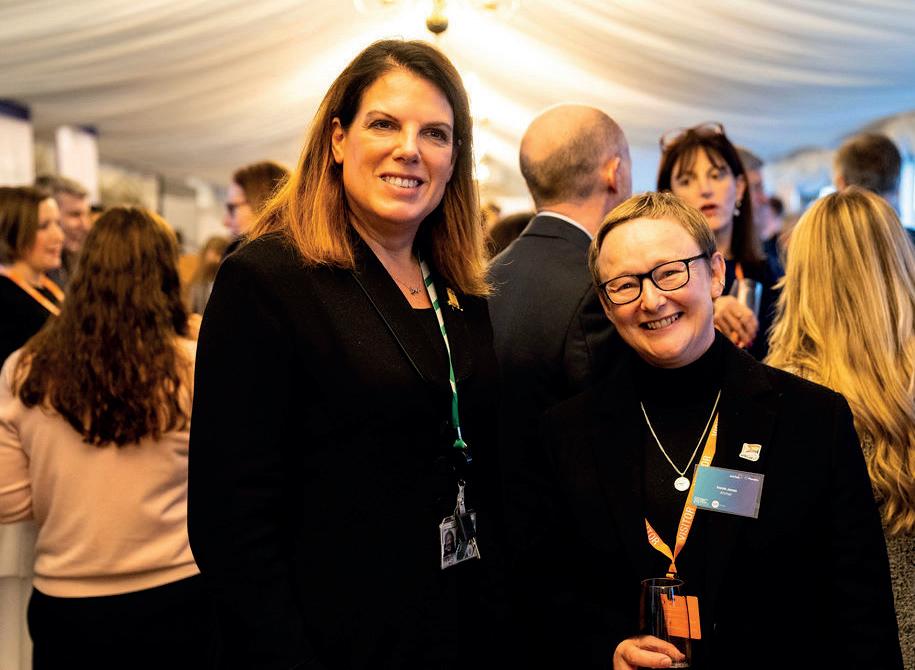
Chair of the Purpose Coalition and former Education Secretary, Rt Hon Justine Greening, reflected on the event as a great opportunity to celebrate the fantastic work that Purpose Coalition members are doing to deliver greater social impact for their colleagues, their customers and their communities: ”The reception gave us a chance to hear about the really important collaborations that members are developing, including the one between Anchor and Plentific, which will help drive positive change. I know many MPs are already connecting with these organisations in their own constituencies to see their work for themselves and to hear firsthand how they are making a difference. I hope that the event gave everyone the opportunity to develop those connections and forge new ones.”
Chair of the Breaking Down Barriers Commission and former member of Sir Keir Starmer’s Shadow Cabinet, Nick Forbes CBE, added: “This Government was elected on a promise of change and a firm commitment to break down the barriers that hold people back. The work that the Breaking Down Barriers Commission is engaged in as part of the wider Purpose Coalition very much aligns with that. It is focused on forging partnerships where we can share best practice and develop new solutions to the challenges that the country faces, based on real-life evidence of what works and the priorities of members’ communities.”
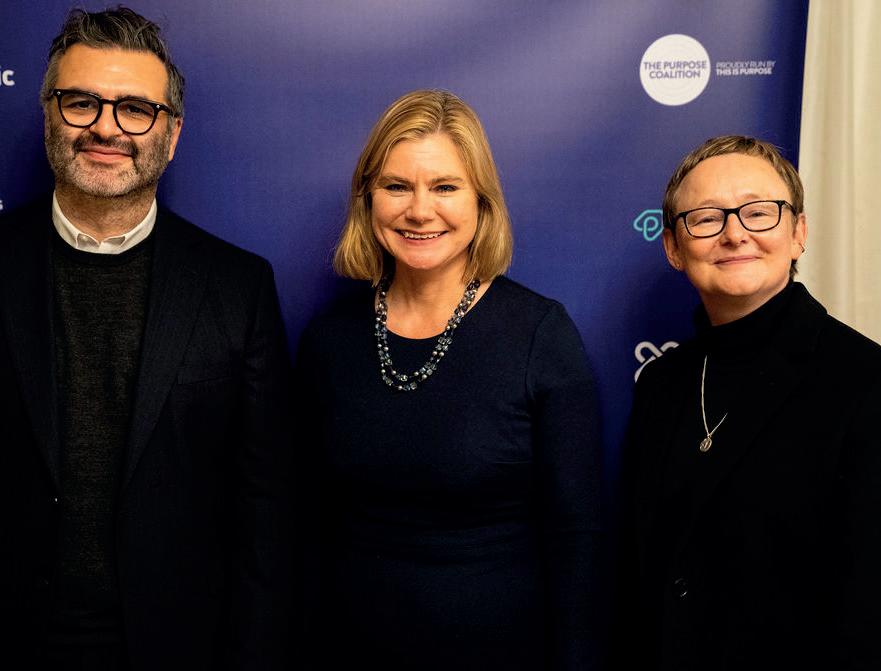
Cem Savas, CEO of Plentific, said: “The reception organised by the Purpose Coalition was a valuable opportunity to engage with newly appointed Ministers, MPs and key stakeholders across the UK housing sector, showcasing our joint mission to utilise technology to make the lives of residents easier. Alongside Anchor, we are connecting communities and digitally transforming housing operations, whilst unlocking efficiencies both within the operations of the business and for residents. We are excited to be working in partnership with Anchor to deliver a tenantfirst experience. Together, we are developing a digital blueprint encompassing our full suite of solutions, which will be replicated across the housing sector, maximising capabilities and taking property operations to the next level.”
Sarah Jones, Chief Executive of Anchor, added: “We know that completing repairs and planned property works on time, to a good standard, at a price that represents value for money is central to our residents’ experience of their homes and it is vital that we get this right. Our partnership with Plentific will help us to achieve this aim, harnessing the power of aligned people, systems and processes to deliver a consistent and responsive service.”
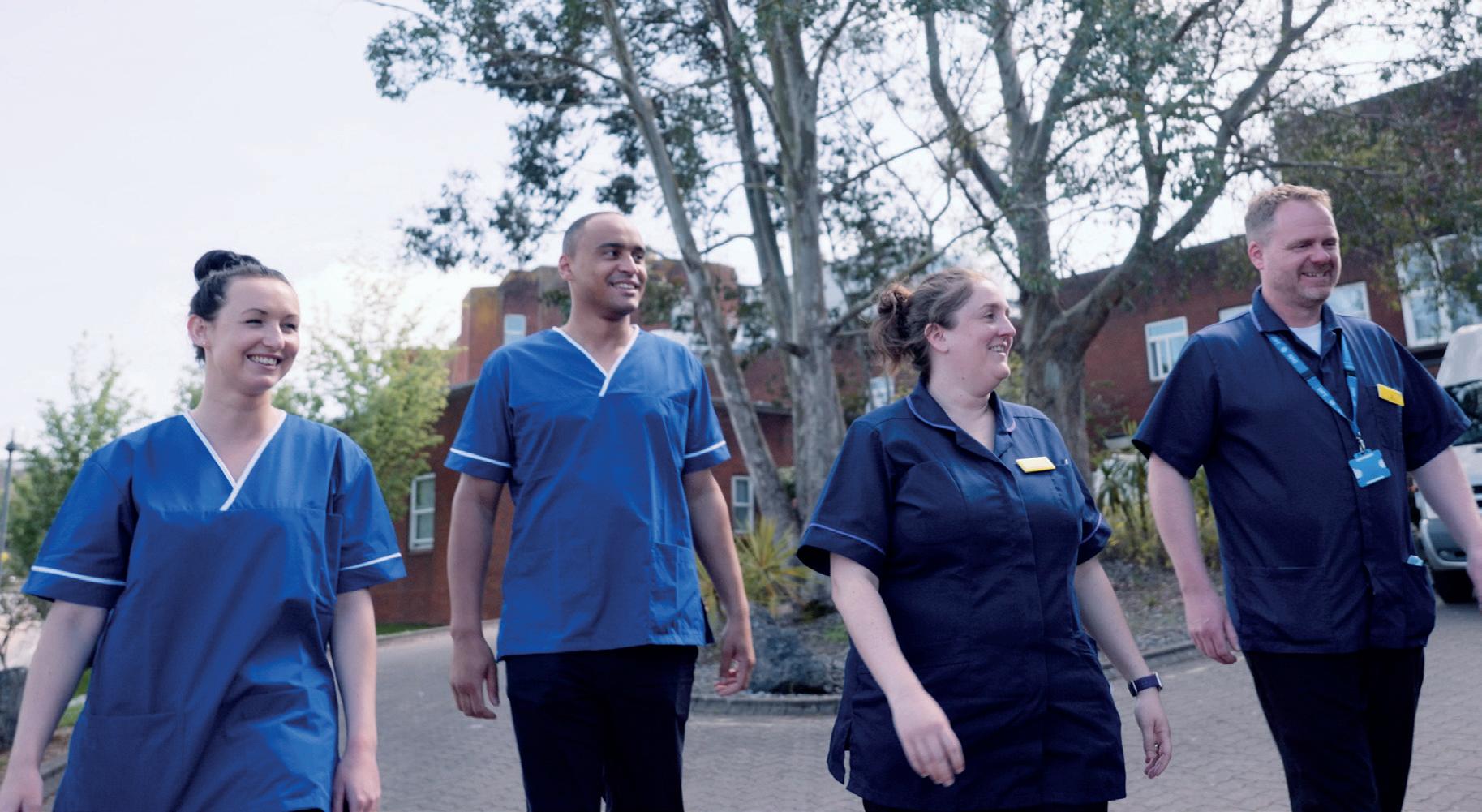
As of March 2024, there were 8,796 vacant medical posts in the UK, amounting to 5.7% of all medical roles. This vacancy rate creates a cycle of chronic stress, increasing pressure on existing staff, which in turn encourages higher turnover and absence rates.
Traditionally the solution to gaps in NHS rotas has been the use of agency locum doctors, which helps in the short term. There is certainly no shortage of locum doctors available, with studies suggesting that more than 1 in 5 doctors in the UK is working as a locum at present.
According to the BMJ, NHS Trusts spend up to 25 times more on locums than on permanent recruitment, with the bill for bank and agency staff in England in 2019/20 coming to £6 billion (Pemberton, 2023).
A third way does exist, which provides continuity of care at fixed rates significantly lower than those charged by locum agencies.
Recently Prime Minister Sir Keir Starmer stated “I am not prepared to see even more of your money spent on agency staff that cost £5,000 per shift”. This references the problem of demand outstripping supply. When demand is high or the circumstances are urgent then the supplier (the locum doctor or the locum agency) can force up the rates almost without limit. With staffing levels as they are, demand is likely to remain high for some time to come.
Locum doctors can be highly experienced, but a model that parachutes an individual into a complex clinical environment and expects them to operate effectively from the outset is flawed. Patient safety is undermined by the lack of continuity of care a locum model engenders.
Whilst regular initiatives attempt to tackle the amount being spent on agency doctors, the practice is so entrenched that this is still seen as the sole option. Whole staffing frameworks are built purely around locum provision to reinforce the message that this is the only way, but is it?
Not necessarily.
A third way does exist, which provides continuity of care at fixed rates significantly lower than those charged by locum agencies.
Managed staffing models operate on a longer term basis, meaning that gaps are filled not just for the next day or night, but for up to twelve months thereafter and usually with the same small team of doctors. This has an obvious benefit for quality of care, patient safety and improved outcomes.
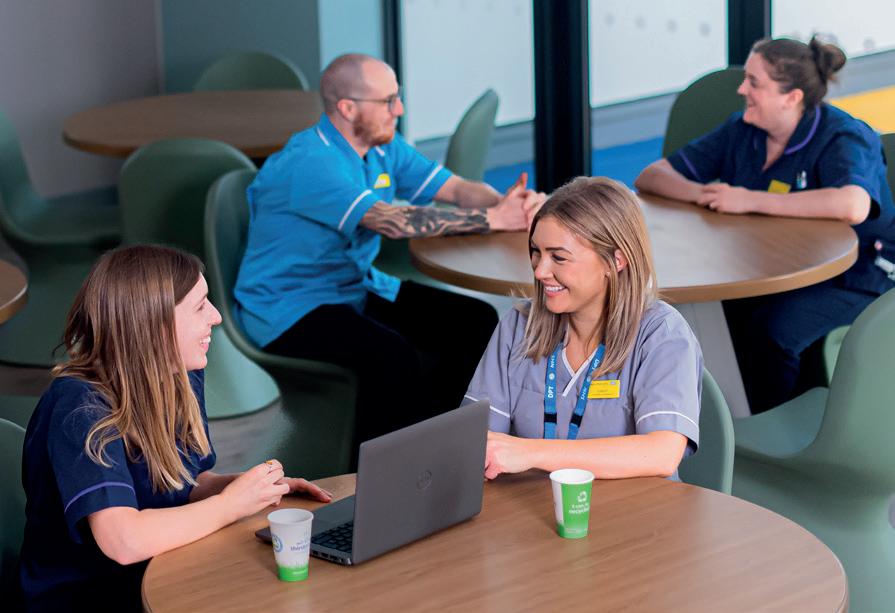
The cost of such a service is contractually fixed at a rate agreed by all parties in advance, meaning it cannot be elevated at times of high demand. This resets the balance of power between the Trust and the supplier, enabling the Trust to work within set budgets.
One such managed staffing contract, operated by NES Healthcare at a Trust in the south of England, was independently audited by one of the Big Four accounting firms. Their conclusion was that the service closely mirrored the costs of the Trust employing its own doctors. This Trust has therefore saved millions of pounds in agency costs over the past few years.
To engage with a service that takes care of the resourcing, employment, administration, cover and replacement of doctors and improves patient safety yet costs far less than locums seems to make obvious sense. So why are more Trusts not looking at this? That might just be down to the need for a change in culture within the NHS.

There is a wealth of talent up and down this country but not everyone gets the chance to fulfil their potential. That means that all too often many are left behind and are never able to use their skills, get a good job and career. That’s not just a personal loss for the individual, but also for employers with a subsequent social and economic cost to the country. Most of the people affected come from the most underrepresented groups – and from the areas that are most disadvantaged.
At the Purpose Coalition, we are driven by a commitment to break down the barriers that get in the way of aspiration and progression. We want to tap into and nurture the talent that is found in our communities, particularly in social mobility coldspots. And we can achieve this by bridging the divide between education and employment.
That is why we have established The Purpose Lab. It will harness the potential of students from universities and colleges by giving them real-world work experience and allowing their voices to shape responsible business strategies and social impact initiatives for some of the UK’s largest businesses. The Purpose Lab will build that bridge between academic studies and industry and business practices.
The Purpose Lab initiative expands on our successful Student Ambassador Programme. Our Student Ambassadors are paid and we make sure that their insights and contributions are heard directly by those in business who we know place considerable value on hearing the voices of younger people. We aim to remove any barriers that would deter students from disadvantaged backgrounds from participating and to encourage them on their journey.
Hearing about the personal journeys and insights from our purpose-led leaders is always inspirational and, for our students, it is invaluable.
We want to foster a generation of business leaders equipped with the skills, perspectives and social awareness needed to tackle the complex challenges we currently face. With access to students’ diverse perspectives, our business members gain fresh ideas and innovative solutions to pressing social and business challenges. The collaboration is crucial not only in empowering students but in helping businesses build socially conscious, inclusive and forward-thinking strategies that are relevant in today’s world.
There has already been significant progress, with over 100 students signing up from Purpose Coalition universities. In the last few months of 2024, we held a series of constructive sessions with Purpose Coalition business leaders where students were able to discuss directly with them how they could shape their careers, as well as share their own lived experiences. Increasingly, young people want to work for businesses that have a clear social purpose and are a force for good. And young people are increasingly interested in the purpose and values that businesses demonstrate which has been reflected in all the sessions we have held.
In one of the sessions, Lisa Dolan, Regional VP of Employee Experience UKISSA at Teleperformance, looked back at her own personal journey which provided a powerful example of resilience and achievement. Her story resonated with our student ambassadors, giving them a unique perspective on navigating career challenges and embracing their own individual paths.
In another session, Claire Costello, Chief People Office at the Co-op, talked about her experiences and offered
invaluable insights into what it means to blend business acumen with ethical responsibility. She highlighted the societal value the Co-op generates for its six million members and the broader community, as well as the part that values play in the running of the organisation. Her input gave the students a different perspective of how her company differs from other businesses. The session revealed just how important it is to have flexible career pathways. Flexibilities enable individuals to chart their own journeys and not necessarily following traditional academic routes. These flexible pathways also allow businesses to attract much more diverse talent, creating a more adaptable and dynamic workforce that brings a fresh perspective into business.
Our student ambassadors have also heard from Shaun Davies, MP for Telford, on his journey into politics and life in Westminster. And recently it was great to be joined by Chris Norbury, Chief Executive of E.ON, who gave the students an insight into purposeful leadership at one of the UK’s largest energy providers. It was also a chance for our students to hear first-hand about the net zero challenges that lie ahead.
Hearing about the personal journeys and insights from our purpose-led leaders is always inspirational and, for our students, it is invaluable. It also gives business insight into some better practice that that they can incorporate into their own business strategies.
I am looking forward to chairing further sessions over the coming months and bringing together more of our Purpose Coalition members with students in this groundbreaking and unique initiative to drive opportunity.
Top rating sees Colt retain its position in the top 1% of global EcoVadis businesses for ESG performance
London, UK 23 January 2025 – Colt Technology Services today announced it has secured a Platinum rating from EcoVadis, the world’s largest and most trusted sustainability ratings provider, for the third consecutive year. Platinum is the highest achievable rating and ranks Colt in the top 1% of global EcoVadis companies.
EcoVadis’ business sustainability ratings are based on international sustainability standards such as the Ten Principles of the UN Global Compact, the International Labor Organization (ILO) conventions, the Global Reporting Initiative (GRi) standards and the ISO 26000 standard. The ratings provide an evidence-based analysis on performance and an actionable roadmap for continuous improvement.

Its assessment evaluates 21 sustainability criteria across four core themes: environment; labour and human rights; ethics and sustainable procurement. This year’s ranking positions Colt in the 99th centile with an overall score of 81 out of 100 for 2024, up from the previous year’s score of 79 and an increase from 75 in 2022.
Progress in Colt’s ESG practices over the past 12 months includes:
• Reduced energy consumption of heating, ventilation and air conditioning: Colt has successfully progressed a number of ‘Smart X’ incubation activities with customers and technology partners. Colt’s Smart Building solution in Colt House collects building data to improve emissions reporting, analytics and diagnostics, enabling AI-driven energy and CO2 emissions optimisation. The use of AI to control the heat and air configuration in the building is expected to produce a reduction of 30% against the 2019 baseline for building energy consumption and CO2 emissions.
• Materials reused, recovered and repurposed: Colt completed a four-year project to remove nearly all its TDM switches (devices used to manage and route multiple signals over a single communication channel) and SDH core network equipment, eliminating 130,000 legacy circuits. Additionally, Colt is collaborating with partners to analyse and recycle decommissioned SDH materials.
• Electrification of its fleet: Colt has continued to upgrade its vehicle fleet to lower carbon vehicles, switching to electric or hybrid fleet cars as well as
Keri Gilder, CEO, Colt Technology Services said, “2024 marked the hottest summer on record and it was the first year that temperatures exceeded 1.5C above pre-industrial levels. There has never been a greater urgency for businesses to act. At Colt, we’re working incredibly hard to drive positive change across all areas of ESG. Securing our EcoVadis Platinum medal for the third consecutive year makes us incredibly proud. It recognises our deep commitment and the significant steps we are taking towards building a brighter, equitable, more sustainable future.”
Caroline Griffin Pain, chief legal officer, Colt Technology Services said, “Our customers rely on us for guidance, support and information to drive their sustainability journeys. It’s a responsibility we take very seriously,
installing charge points in all Colt sites. At the end of 2024, 38% of its vehicle fleet were full Battery Electric Vehicles (BEV) and a further 49% were Plug-in Hybrid Electric Vehicles (PHEVs).
• Inclusive Employers Standard achieved: Colt secured Bronze in the Inclusive Employers Standard, a globally recognised benchmark for workplace inclusion and diversity. The standard enables Colt to benchmark and measure progress across various DEI areas using a maturity model.
• Progressed its Social Impact Strategy: Throughout 2024 Colt has progressed its Social Impact Strategy, supporting charities which help disadvantaged children, young people and other underrepresented groups, with digital inclusion and STEM education.
• Publication of its United Nations Global Compact report: Colt, as a member of the United Nations Global Compact (UNGC), published its Communication of Progress (COP), demonstrating Colt’s ongoing commitment to adhering to the ten principles of the UNGC, which cover areas such as environmental protection, human rights and labour standards.
and one that informs and shapes our ESG strategy and values. At Colt, these values are our guiding principles, and they’re fundamental to our culture and behaviours. We’re absolutely delighted that our progress in ESG has been recognised once again by EcoVadis as we continue our journey to reach net zero carbon by 2045 and strive to build an inclusive business where everyone is welcome”.
Since launching its ‘sustainability by design’ strategy in 2021, Colt has intensified its efforts to combat the climate crisis by setting and achieving ambitious science-based targets. By 2045, Colt aims to reach net zero emissions and inspire the industry to take meaningful action. More information on Colt’s progress in ESG and its ambitious targets to Net Zero can be found in Colt’s third sustainability report.

Newcastle-based open-access rail operator Lumo is reshaping the future of rail travel, bringing socio-economic transformation to the North East and beyond.
In an industry-first, the company is solidifying its position as a champion of innovation and sustainability while securing jobs, attracting inward investment, and paving the way for growth across the region.
At the heart of this transformation is a landmark £500 million rolling stock deal, announced by Prime Minister Sir Keir Starmer during a visit to the Hitachi Rail plant in Newton Aycliffe, County Durham in December. This agreement not only safeguards the future of the plant but also heralds a new era of open-access rail travel, with the addition of 14 new five-car Class 80X Hitachi trains to FirstGroup’s fleet, manufactured here in the North East.
Securing Jobs and Building Skills
For the Hitachi Rail plant in Newton Aycliffe, the announcement is a lifeline, ensuring the continuity of manufacturing operations and protecting hundreds of skilled jobs in the local area. The £500 million investment guarantees the production of 70 rail cars and reinforces the plant’s reputation as a cornerstone of UK rail manufacturing.
Prime Minister Starmer highlighted the deal’s significance, stating, “This agreement represents a major step forward for British manufacturing. It secures jobs, builds on the expertise of County Durham’s workforce, and demonstrates the transformative potential of private investment in our railways.”
The move also provides a stable platform for upskilling the workforce, ensuring the North East remains a hub for rail innovation and expertise. This year, we celebrate 200 years of the Railway, reflecting on the first passenger rail service between Stockton and Darlington. Twohundred years later, the North East is still firmly on the map for pioneering this industry forward.

Driving Economic Growth Through Open Access Rail Lumo’s, the award-winning open access rail operator privately funded model that assumes full commercial risk—has proven to be a powerful engine for economic growth. By adding capacity to core routes, Lumo is making rail travel more accessible, affordable, and sustainable – with each journey between London and Edinburgh emitting 95% less carbon than flying. Independent analysis from ARUP has projected Lumo will deliver £740m in economic impact until the end of it’s track access agreement in 2033.
The new fleet of Class 80X trains will expand Lumo’s services, including the recently announced Carmarthen-London route and increased capacity for its existing Hull Trains and Lumo operations on the East Coast Main Line. Importantly, these services are designed to offer passengers a reliable, cost-effective alternative to car and air travel, supporting the UK’s transition to greener transport.
The £500 million investment represents just the beginning of Lumo’s ambitious plans. The company has applied to the Office of Rail and Road (ORR) to expand its network further. Proposed new routes include services between London and Glasgow via Edinburgh, London and Rochdale via Manchester, and a potential link between London and Paignton, starting as soon as 2027.
If approved, these routes would dramatically enhance connectivity across the UK, providing faster, greener alternatives for passengers traveling between major cities and regions. The investment also includes an option for an additional £500 million to lease up to 13 more trains, should these applications be successful.
The ripple effects of Lumo’s growth extend beyond railways. By anchoring such a significant investment in the North East, the company is attracting further interest from businesses and investors eager to capitalise on the region’s revitalisation, taken forward by the firstever North East Mayor, Kim McGuiness. Improved connectivity enhances the appeal of local hubs, creating opportunities for new enterprises and encouraging established companies to expand their operations.
And it’s not just big business than benefits. Lumo already has a strong-track record of partnering with local businesses, and fostering local supply chains for it’s on-board catering offer – transporting North East enterprises across the country and to the UK’s capital. With partnerships including Gateshead FC, Donzoko Beer, Newcastle Falcons, Newcastle Eagles, Newcastle College, Beamish Museum and more, it’s clear to see how this innovative rail operator is putting a spotlight on what the region has to offer.
Looking ahead
Lumo’s commitment to driving socio-economic change, securing local jobs, and attracting inward investment highlights the transformative potential of open-access rail. As the company continues to grow, its impact will be felt far beyond the tracks—boosting local economies, fostering innovation, and connecting communities across the UK.
Martijn Gilbert, Lumo’s Managing Director, said: “Growth and innovation are key to delivering a better railway. At Lumo, we’re proud to be at the forefront of delivering services that truly make a difference. We are delivering regional and national integration, at price points people can afford – stimulating growth on the railways and growth in our towns and cities. We’re also doing it with our customers at the heart of our operations – we’re proud of our 96% customer satisfaction score and our award-winning all-electric Hitachi fleet. This year we’re looking forward to doing more.”
With the £500 million investment marking the start of a new chapter, Lumo is proving that rail travel can be a powerful force for positive change. In the North East and beyond, the future of rail has never looked brighter.
By Dr Jonathan Shaw, former surgeon and emergency physician and Clinical Director at System C.
Lord Darzi’s independent review of the NHS paints a sobering picture of an overburdened system straining under the weight of escalating demands. He highlighted how the service is in a ‘critical condition’ with issues around efficiency and access to services. The report made numerous recommendations for improving the NHS which included driving productivity in hospitals through more capital investment and making more use of technology. Similarly, the NHS England Long Term Workforce Plan, published last year, explicitly called for productivity gains in exchange for expanding staff numbers.
The issues currently faced
A recurring concern voiced by health and social care staff is the substantial amount of time taken up by administrative duties. Health and care professionals find themselves bogged down with clerical work that could be handled by support staff and intelligent systems, diverting precious hours away from their core responsibility – providing exceptional care to individuals. A significant amount of time is spent on tasks such as taking patient notes, reviewing results, care planning, capturing structured information so that coded data can be used elsewhere, or corresponding with colleagues and other care providers. Phone calls or notes in unstructured format need to be typed up and many organisations still collect data manually. The latest LGA survey found that social workers are increasingly weighed down by administrative work and were managing more complex caseloads.
The potential of AI
This is where AI can make a significant impact. Clinical and social care notes are information-rich sources, with complex workflows, making them ideally suited for AI applications. It can not only reduce the amount of manual entry of documentation, but it also allows health and social care providers to streamline processes, optimise resource and provide more proactive care. AI’s capabilities extend beyond just summarisation; it can assist users with the next steps of performing actions and tasks within an individual’s record. This empowers health and social care professionals to focus on what truly matters. The true potential of AI is how it can boost efficiency for both the people using services and the organisations providing them. By putting AI to work on those tedious, time-draining tasks, we can streamline operations like never before.
But it’s about more than just saving time and effort. Bringing AI into the mix creates an opportunity to raise quality standards and consistency across the board. By automating all the monotonous admin work, we free up human experts to focus on the high-level, person-centred aspects that really matter. This allows social workers and clinicians to be present in a conversation with people rather than busy taking notes. Blending human expertise with the power of AI will ultimately improve quality of care. And thanks to AI’s ability to standardise processes based on data-driven best practices, we can ensure the same experience no matter where services are delivered.

importance of maintaining human oversight and accountability
A crucial principle in the use of AI is maintaining human oversight and validation throughout the process. Ultimately, the final decision-making authority should remain with the human experts, such as social workers or clinicians. They must be the ones to validate and confirm the outputs and recommendations generated by AI systems. For instance, when an AI tool helps to summarise a care plan or handover summary, the social worker or healthcare professional should review and approve it, ensuring its accuracy and appropriateness. There are various use cases and examples where this humanin-the-loop approach is essential across different social care scenarios. While AI can be a helpful tool, we need the expertise and judgment of human care professionals to lead the way. This is especially true in social care - for example, if an older person says they want to see the moon, AI might take that literally, but a human caregiver would understand the deeper meaning behind that wish and find a more meaningful way to address it in their care plan. Social care is all about complex human emotions and needs that AI alone can't fully grasp. By combining human understanding with AI's analytical abilities, we can provide truly personalised, empathetic care.
Safety and ethical practice are paramount Ensuring the safe and ethical integration of AI is critical. There are many temptations to cut corners and approach it in a more cost-effective but potentially exploitative way, especially when it comes to health and social care data, but we must have robust safeguards and oversight so that we don’t misuse personal data. Prioritising privacy, transparency and responsible data stewardship is key here. This balanced approach, which places the wellbeing of individuals and communities at the forefront, is critical to upholding high ethical standards when it comes to AI. If we start using ChatGPT or Google translate for writing patient letters, for example, there is no assurance of patient confidentiality.
But doing all this properly isn’t easy - the process of implementing and maintaining specialised health and care technologies can be costly and complex. There’s a significant
amount of governance and overhead involved in setting up these systems appropriately. What’s more, the social care sector tends to have less regulation compared to the healthcare industry, meaning that these technologies are not always treated as medical devices in the same way. This creates additional risks and challenges when deploying these types of solutions. At System C this is something we’re very passionate about. We’ve partnered with Microsoft to ensure we’re creating a properly governed system which complies with NHS guidance around data processing. We’re making sure that the data we put into our AI system is secure, compliant and safe.
Ultimately leveraging AI efficiencies is not just about doing things quicker or cutting costs. It’s a chance to totally transform operations and set new benchmarks for quality. Timely and informed actions at the outset can significantly reduce the length of hospital stays and provide the best possible care outcomes, therefore unlocking other benefits as a result but it must be pursued with robust safeguards and a commitment to ethical AI principles to harness its full power.
BY JENNIFER RUDMAN, INDUSTRY DIRECTOR (EQUINITI) AND 2024’S
PROSHARE ‘EMPLOYEE SHARE PLANS CHAMPION OF THE YEAR’.
A recent report by the Resolution Foundation highlights the financial vulnerability faced by many Britons, with over 11 million working-age individuals having less than £1,000 in savings¹
This financial fragility underscores the importance of initiatives that encourage saving and investment for the medium term, to help build financial resilience and wealth creation amid ongoing economic pressures.
Employee share ownership plans in their current form have been consistently helping millions of British workers to save and invest ever since their launch in the 1980’s and 2000’s. These proven vehicles are ready to support today’s workers to build financial resilience.
Equiniti has administered employee share plans for over 40 years and in that time has seen millions of employees from both listed and private companies, and across all sectors, benefit from receiving shares from their employers.
The plans give employees a stake in the company they work in, enabling them to benefit directly from growth in their company, often driven by the wider economy, and helping them connect with the purpose and mission of the company.
They feel better able to invest and build their skills, career and savings over the medium to long-term.
Crucially, employee share plans are shown to act as a stepping stone to personal investment and improved financial education. EQ’s research² shows that once employees own shares via their employee share plan, they are more likely to invest in a wider range of companies, building their resilience.
Over the past few years, Equiniti has seen a large increase in the number of employees transferring their shares into Individual Savings Accounts as part of their medium-term financial plans. This works alongside pension scheme contributions, which are looking to the long term.

These schemes have been firmly supported cross-party³ and current employee plans include Enterprise Management Incentives (EMI), Company Share Option Plans (CSOP), Save As You Earn (SAYE or Sharesave) and Share Incentive Plans (SIP). With the employing company responsible for their administration and deductions direct from pay, employees find these plans easy to use and keep using.
Despite their benefits, on average less than 40% of eligible employees participate in contributory share plans.⁴ In 2023, HM Treasury launched a call for evidence on SAYE and SIP, asking stakeholders to consider opportunities to improve and simplify the two plans.
Research shows a key reason for non-participation is the length of time before full tax advantages are realised, with many employees, particularly younger employees, believing the period too long for them to benefit.⁵
With SIP it would increase adoption, particularly for lower paid employees and those with shorter employment horizons, if the tax-free period reduced from five to two years.
For SAYE it would increase overall investment and keep capital in the UK stock market if all leavers are able to use their savings to buy shares rather than just receiving back their savings.
These changes would firmly support workers to participate in growth and would reflect modern trends in job tenure.
A central consideration, especially with the cost of living, is affordability.
As an optional feature for companies who work hard to support their employees, a choice for employers to make an SAYE ‘Company Contribution’ towards employees’ overall monthly savings could bridge affordability. Additionally, where this is offered, the company could then choose to auto enrol all eligible employees, transforming participation as happened with pension enrolment. This proposal would break down barriers to investment, giving all employees (regardless of personal income) an opportunity to participate.
Research shows a key reason for non-participation is the length of time before full tax advantages are realised, with many employees, particularly younger employees, believing the period too long for them to benefit.
¹The Resolution Foundation Cautionary Tales Report, 2024 ²Equiniti Shareholder Voice Report, 2021 ³SIP introduced under Gordon Brown in 2000, SAYE introduced under PM Margaret Thatcher in 1980 ⁴ProShare SAYE & SIP report published on 12 August 2024 (between 2020 and 2023 overall take-up was 36.91% across all SAYE schemes, on average 32.00% joining each year) ⁵ProShare’s ‘Attitudes to Employee Share Ownership’ Report
We already work with private market providers, though welcome the Government’s support of the Private Intermittent Securities and Capital Exchange System (PISCES).
By including employee shareholders, this enables them to benefit from the sale or refinancing of the company, allowing them to benefit from PISCES.
Combining that with the savings and investment opportunities through changes to broad based tax advantaged share plans, provides a stepping stone to growth in investment, further employee engagement and sharing of wealth creation amongst workers across all levels of public and private companies.
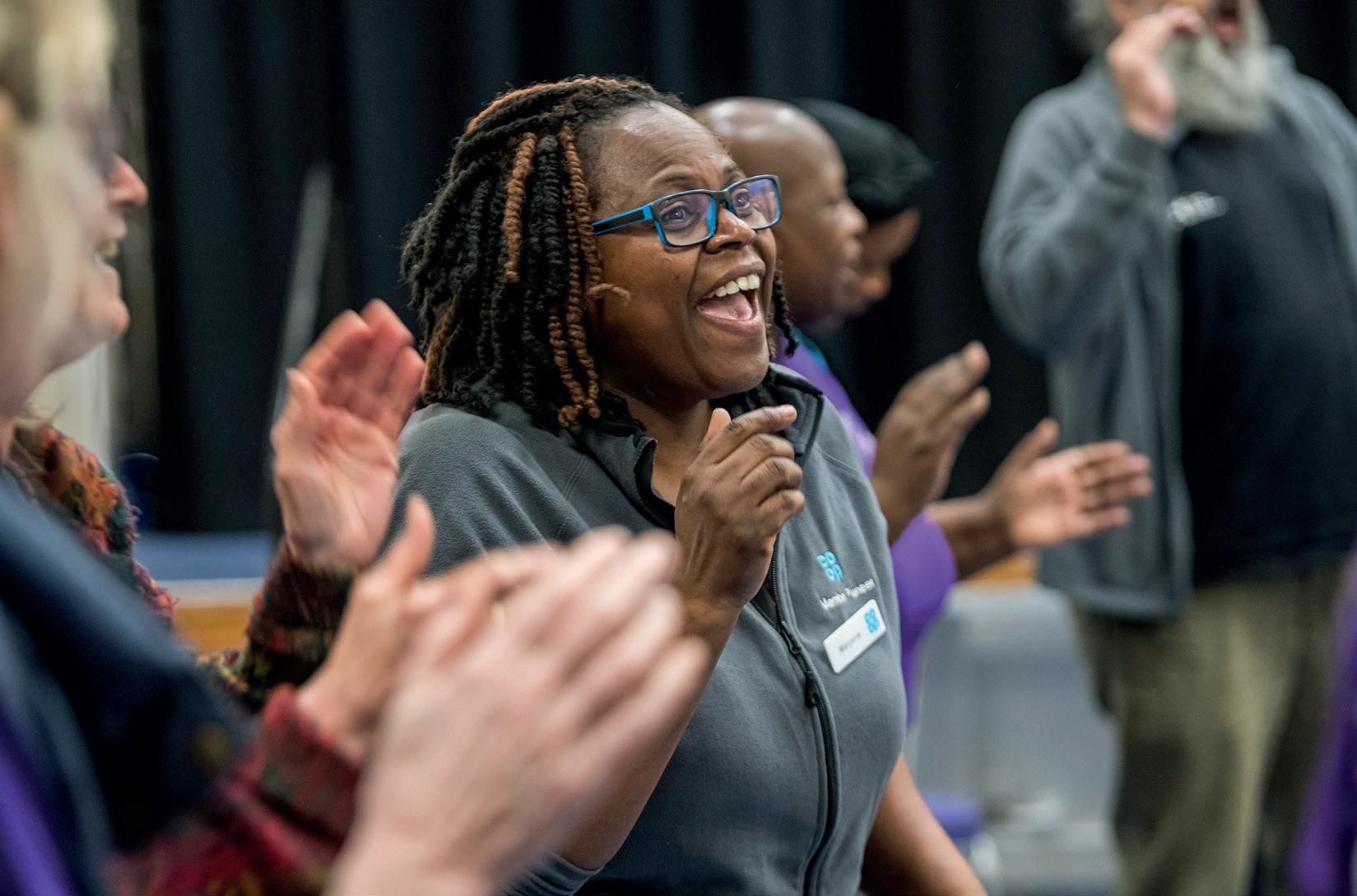
The Purpose Lab, an initiative by The Purpose Coalition, is not just a concept, it’s a transformative space where ideas meet impact.
Through sessions featuring pioneering leaders like Claire Costello, Chief People Officer at the Co-op, the Purpose Lab underscores the power of purpose-driven organisations to reshape societal norms and elevate inclusion, social mobility, and opportunity.
Our recent webinar offered a masterclass in what it means to blend business acumen with ethical responsibility. The Co-op, a storied institution founded by the Rochdale Pioneers nearly two centuries ago, has evolved into a multifaceted enterprise.

Beyond its 2,600 retail outlets, it operates in funeral care, legal services, and wholesale—all while staying true to its cooperative roots. Its success isn’t measured solely in profits but in the societal value it generates for its six million members and the broader community.
During the session, our ambassadors were given an insight into exactly what it means to be a cooperative and how values play an important part in the running of the organisation. The students were interested to hear from Claire about how this differs from other businesses and her own personal experience.
The Co-op’s inclusion strategy goes beyond recruitment and workforce representation. It interrogates every facet of the business from product ranges to marketing campaigns, ensuring they reflect and serve the diverse communities the organisation touches. Its commitment to democratic values empowers members to influence decisions that shape not just the Co-op’s trajectory but societal outcomes. For instance, member-driven initiatives have catalysed campaigns against shop-worker abuse and for ethical sourcing, demonstrating how collective ownership fosters accountability and meaningful change.
The Co-op’s approach to apprenticeships further exemplifies its ethos. By redirecting unspent gifted apprenticeship levy funds to socially and economically disadvantaged areas, it creates pathways for individuals traditionally excluded from opportunity. This is not charity, it is systemic change, addressing skills gaps while nurturing local economies.
The Purpose Lab captures the essence of such transformative leadership. It is a platform where organisations share best practices, challenge the status quo, and collaboratively design strategies that break down barriers.
Claire Costello, Chief People Officer at Co-op said: “Thank you for inviting me and I loved meeting the students. It was a great opportunity to share how a Co-operative model is a very different way of doing business to that of a PLC with the Student Ambassadors, and to also share some of the wide range of careers that

are available across the breadth of retail and our other business areas of Life Services and support centres. It was great to see the mix of questions and interest in how we operate - the new generation coming into our places of work are going to hold us (rightly) to very high standards!”
One standout takeaway from this recent session is the importance of flexible career pathways. The Co-op’s approach, eschewing rigid graduate schemes in favour of “graduate-ready roles” demonstrates a nuanced understanding of modern careers. By enabling individuals to chart their own journeys, the Co-op not only attracts diverse talent but ensures its workforce remains adaptable and dynamic.
Our ambassadors discussed how they could shape their own careers and bring their own lived experienced to an organisation. We are increasingly seeing that students are more interested in the purpose and values of an organisation when looking for an employer rather than a specific sector or role, and this was evidenced within the session.
By amplifying stories of organisations that walk the talk, the Purpose Lab inspires others to embed purpose into their core operations. This is not just about making work meaningful, it’s about redefining success in a way that uplifts individuals, communities, and society as a whole.
The Co-op’s journey is a powerful reminder that organisations can and must be agents of change.

As I reflect on the first 100 days of the new government and await the Chancellor’s Autumn Statement, the need for a joint, inclusive effort to tackle barriers to opportunity across the UK is clearer than ever. Last year, we launched our Breaking Down Barriers Commission, chaired by Nick Forbes CBE, former leader of Newcastle City Council.
The Breaking Down Barriers Commission is a key initiative under The Purpose Coalition, focused on addressing and eliminating the obstacles that prevent individuals from achieving social mobility and equal opportunities. Bringing together leaders from business, education, and government, the Commission explored practical solutions to dismantle these systemic barriers. Our core aims are to influence policies and practices that foster a more inclusive and equitable society, sharing insights, best practices, and collaboration that provides tangible impact.
The government’s recent establishment of the Office for Equality and Opportunity to “break down barriers to opportunity” signals a welcome commitment to levelling the playing field for all. However, the true potential of this office lies in its collaboration with businesses,
employers, local authorities, and communities, the entities that drive real change on the ground.
At the Purpose Coalition, our members have been leading the way in breaking down these barriers, with E.ON being a prime example of an organisation truly ahead of the curve.
The recent launch of E.ON’s Breaking Down Barriers Impact Report at a reception in the House of Commons attended by over 40 cross-party MPs laid out a clear blueprint for change. E.ON has demonstrated its commitment to social impact and sustainability through the lens of People, Power, and Purpose. In today’s rapidly evolving energy landscape, E.ON understands that breaking down barriers requires a holistic approach, one that encompasses customers, colleagues, and the communities it serves.
Through working in partnership, E.ON continues to lead on both energy security and the transition to net zero. The E.ON Next Leaders Event which Callum Crozier and Danny Davis in our team supported, highlighted this forward-thinking approach, nurturing a new generation of leaders primed to take on future challenge.
At the Labour Party Conference in September, we hosted the E.ON Warmer Homes Reception alongside Bill Esterson MP, an event that reinforced the role businesses play in addressing the energy needs of the most vulnerable while advancing the net-zero agenda. As Chair of the Energy Security and Net-Zero Select Committee, Bill Esterson MP plays a pivotal role in overseeing the UK’s progress towards net-zero. His engagement with E.ON is crucial, allowing the company to share its expertise directly with policymakers, contributing valuable insights and shaping policies to guide the nation’s energy transition. This collaboration ensures that practical, on-the-ground solutions from leaders like E.ON are integrated into the UK’s journey to net-zero, balancing sustainability with energy security.
This type of proactive, on-the-ground work is what will truly break down barriers to opportunity, not just topdown policy from Westminster. The new Invest 2035 strategy, which focuses on creating a pro-business environment, is a significant step forward. However, Purpose Coalition members like E.ON are already shaping the future by implementing practical solutions that meet both business goals and societal needs.
E.ON’s partnership with Coventry City Council through their Strategic Energy Partnership offers a pioneering example of this exact approach. By focusing on green skills, innovation, and community benefit, E.ON is tackling climate change while simultaneously improving social mobility. This partnership, and others like it, shows that businesses have a critical role in creating sustainable communities that can thrive.
While the government’s recent initiatives, including the creation of the Office for Equality and Opportunity, are promising, their success depends on learning from and working with businesses that are already ahead of the curve.


Breaking down barriers to opportunity requires everyone to play their part. From Westminster policymakers to businesses like E.ON, we must all work together. The Purpose Coalition is proud to partner with forward-thinking organisations that are delivering change, not just promises. Together, by putting purpose at the heart of business, we’re building a more inclusive and prosperous future for all, regardless of background or postcode.
It’s vital that every individual within E.ON considers how their role generates impact not just for the company, but for society. By feeding into our collective, purpose-led approach, each of us plays a part in building a more inclusive, sustainable future.
Rt Hon Justine Greening, Chair of The Purpose Coalition

The workplace has long been a stage for addressing inequality and driving social progress, and now the conversation must evolve to include women’s health in a meaningful and actionable way.
Curtins, a leading engineering consultancy, offers a compelling model of leadership with its Breaking Down Barriers Impact Report, created in collaboration with The Purpose Coalition. Among the report’s standout initiatives is a bold focus on menstrual health and gender equity within the construction industry—a sector historically resistant to addressing such topics. Curtins’ work underscores the urgent need for policy reform and industry-wide collaboration to create inclusive workplaces where all employees can thrive.
The challenges faced by women in workplaces, particularly in male-dominated industries like construction, remain pressing and under-acknowledged. Curtins’ menstruation campaign highlights this stark reality. Women continue to encounter inadequate facilities, insufficient awareness among peers and management, and a broader culture of silence around menstruation and menopause.
This silence is not just a cultural failing; it has tangible consequences for productivity, employee wellbeing, and talent retention. Curtins has broken this silence by normalising discussions around menstrual health and implementing practical solutions, such as providing sanitary products in offices and pool cars and offering education sessions on menstrual and menopause health for employees and managers. These initiatives mark a pivotal shift in how workplaces can acknowledge and address women’s health as a key factor in employee wellbeing.

Curtins’ efforts reflect a comprehensive and proactive approach to fostering equity. The report reveals how the company has addressed menstrual health head-on by upgrading site facilities, introducing flexible work arrangements for women managing menstrual health challenges, and promoting awareness through targeted training.
Their work exemplifies how businesses can lead change from within. By ensuring women’s health needs are addressed, Curtins has sent a clear message: inclusivity and equity are not optional—they are essential. These efforts serve as a rallying cry for other organisations to adopt similar measures and, more importantly, to join the push for systemic policy change.
Despite progress at the organisational level, women’s health remains a glaring omission in workplace policy frameworks. Research highlighted in Curtins’ report underscores the lack of industry-wide or governmental guidelines addressing menstrual health, a shortcoming that perpetuates stigma and inequity. Without regulatory standards, progress is inconsistent and overly reliant on the willingness of individual organisations to act.
Curtins has taken the lead by advocating for menstrual health provisions to be embedded into industry health and safety standards. This call to action is both timely and necessary. Policymakers and industry leaders must collaborate to establish comprehensive guidelines, ensuring that issues such as adequate sanitary facilities, flexible working options, and awareness training become standard practice, not the exception.
Addressing women’s health in the workplace is not just about fairness; it is a business imperative. When women are supported, businesses gain access to a more engaged, productive, and loyal workforce. The economic case for such policies is clear, with studies linking employee wellbeing to enhanced performance and reduced absenteeism.
For sectors like construction, where the gender imbalance remains stark, proactive measures on women’s health could serve as a critical lever for
attracting and retaining diverse talent. Curtins’ initiatives, including its reverse mentoring programme and focus on gender inclusivity, demonstrate how organisations can use internal policies to drive broader cultural change within their industries.
Curtins’ impact report makes a powerful case for the role of businesses in driving social progress, but it also emphasises the need for collective action. Business leaders, policymakers, and industry bodies must come together to create a unified approach to women’s health in the workplace.
This collaboration should prioritise:
1. Policy Reform: Establishing industry-wide standards that embed menstrual and menopause health into workplace health and safety guidelines.
2. Education and Awareness: Expanding training for managers and employees to foster understanding and reduce stigma around women’s health.
3. Infrastructure Improvements: Ensuring all workplaces provide adequate facilities and resources to meet the needs of women employees.
4. Flexibility and Support: Normalising flexible working arrangements to support women dealing with health challenges without penalising their career progression.
Curtins’ leadership in addressing women’s health within its operations is a bold step towards a more inclusive and equitable workplace culture. It demonstrates that businesses not only have the power to enact meaningful change within their organisations but also to influence industry norms and policy landscapes.
The time has come for other businesses and policymakers to follow suit. By addressing women’s health as a critical workplace issue, we can dismantle outdated norms, enhance economic participation, and engineer a future where opportunity truly knows no barriers.
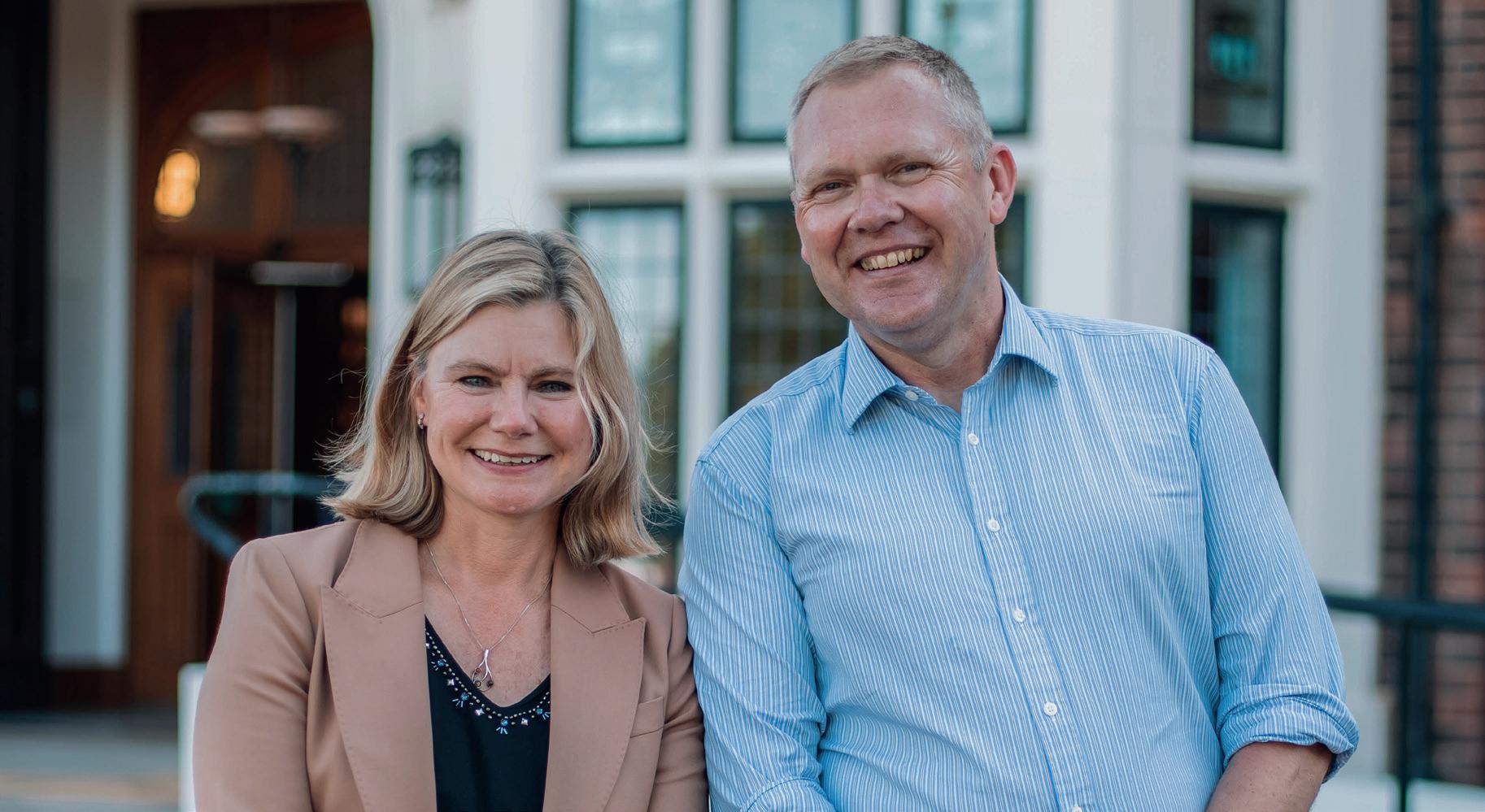
BY NICK FORBES CBE, FORMER MEMBER OF KEIR STARMER’S SHADOW CABINET
A year ago, we launched the Breaking Down Barriers Commission. Part of the wider Purpose Coalition, the intent was to consolidate the learning and experience of businesses, universities, NHS Trusts and other organisations involved in our network of creating more opportunities and challenging head-on the obstacles that prevent people from achieving their full potential. At the heart of this work is a strong belief in the power of business as a force for good, and a determination to make a difference wherever we can – without waiting for permission from Government or regulators.
Our ambitions aligned with those of a Labour Opposition that was destined for Government, with broad Missions aiming to reduce inequality, support communities and create opportunity. The election result in July 2024 showed the electorate shared this appetite for change, but the advent of a new government represented so much more than a political shift. It became a catalyst for businesses to redefine their role in society, creating and demonstrating positive impacts that resonate well not just with policy makers but with their customers, colleagues and communities.
The Breaking Down Barriers Commission stepped up its work in those early months of the new administration, bringing together new MPs with leading businesses to exchange views on the significant challenges the country faced and to identify where they could make a difference. It was clear that many businesses aspired to go beyond their core business function and make their social impact work more than a tick-box exercise. They were aiming for much more direct action that would actively change lives for the better. The Commission worked with them to help redefine their roles in a way that would deliver more strategic, long-term outcomes. Its growing membership and engagement across the political spectrum also reflected a commitment by the new cohort of Labour MPs to drive the agenda for a more equable and fair society.
Through a series of roundtables in which Purpose Coalition members from businesses, universities and health and social care organisations participated, we have listened to what they have to say about their own experiences across a wide range of sectors, facilitated constructive discussion and developed a compelling evidence base of good practice.
Now as we look ahead to a new year, the Breaking Down Barriers Commission will be building on its partnership work as I chair a series of Westminster Roundtables. They will be based on the Citizens Assemblies format, pioneered by Georgia Gould MP during her time as Leader of Camden Council, and with whom I was pleased to host a roundtable in May 2024.
The Roundtables will bring together key MPs and Purpose Coalition businesses and public sector leaders. Each session will tackle a key policy question, explore best practice that will enable workable solutions and develop specific recommendations for government. They will be split into three public policy areas –health, place and partnership – with four policy questions discussed in each. They will allow Purpose Coalition leaders to make their voices heard and policymakers to hear directly from employers under private Chatham House style rules. Policy notes will be produced from each session and insights shared with government, culminating in a meeting of all participants towards the end of the year where further recommendations will
The Government has pledged a focus on early years to give children the best start in life
be compiled and submitted to government. Additionally, we will be holding a series of monthly political webinars to maintain the close working relationships between MPs and our members. That will be particularly important as the Prime Minister seeks to reach a set of ambitious but achievable milestones, based on the original Five Missions, to drive real improvements in the lives of working people.
The Breaking Down Barriers Mission in particular will require cross government collaboration, working in partnership with business, universities and the wider public sector to deliver it. The Government has pledged a focus on early years to give children the best start in life, with the target of a record 75% of five-year-olds in England ready to learn when they start school. In fact, the first Goal in our 15 Purpose Goal framework which identifies the major barriers to opportunity is a Strong Foundation in Early Years. Research suggests that on average 40% of the development gap between disadvantaged 16-years-old and their peers has already emerged by the age of five so it’s clear that getting the best possible start is crucial to their development, health and life chances. It is just one area where many of our members are already making a valuable contribution in their own communities and will be in a prime position to feed in their views, discuss their own experiences and share their best practice.
Our programme for 2025 is an exciting and dynamic chance to shape the social impact agenda with government – to better understand the barriers to opportunity and to develop collaborative solutions that really reflect the priorities of business and the communities they serve. Our reputation as the “go to” network for answers puts us in a strong position to strengthen the relationships we have across the political spectrum and build positive, powerful partnerships for change.
By Rt Hon Justine Greening
E.ON UK’s 2024 Inclusion Report highlights a progressive commitment to building an equitable future through a workplace culture that prioritises diversity, inclusion, and the upward mobility of its people. The report is a testament to how targeted efforts and visionary leadership can break down barriers, improve opportunities, and drive impactful societal change.
As Rt Hon Justine Greening reflects, “E.ON is setting the benchmark for how purpose-driven organisations can tackle gender inequality and career barriers. By investing in people and creating inclusive opportunities, they’re not just powering homes and businesses but empowering lives.”
E.ON UK’s commitment to upward mobility is evident through its open access development networks, mentorship programmes, and targeted initiatives for underrepresented groups. Notably, programmes such as E.ON’s Customer Solutions Universe-ity as well as their apprenticeship schemes have transformed over 1,000 careers, providing accessible, fully funded pathways for individuals to acquire advanced skills. From engineering to digital marketing, apprenticeships offer practical experience paired with academic progression, and E.ON is ranked among the UK’s top 30 apprenticeship providers.
61 % of members in E.ON’s development networks are women, and
We’re committed to building an inclusion organisation, and through opportunities for growth and development, we believe everyone can thrive. Recognition as Best Employer for Women and our Menopause Friendly Accreditation are milestones of our inclusive culture.”
Helen Bradbury, Chief People Officer at E.ON UK, added.
27 %
come from ethnically diverse backgrounds, demonstrating progress in building a diverse talent pipeline.
E.ON UK’s focused gender equality measures have delivered tangible results. The Fast Forward network, designed to empower women in the workforce, has created pathways for leadership through bespoke initiatives such as Women in Leadership, a programme blending workshops, networking, and career coaching. Promotion rates for women have climbed from 2% to 10% over three years, aligning with the rates for men.
The number of women in senior executive roles at E.ON has risen by 6% to
%
working towards an ambition of 50% by the end of 2025.
The company has also taken a proactive stance on addressing barriers that disproportionately impact women, such as maternity transitions and menopause. Monthly maternity cafés, maternity coaching trials, and the Menopause Matters network provide practical and emotional support for those navigating life’s challenges.
This support extends to their family friendly approach, which promotes flexible working for all, focusing on the benefits for performance, wellbeing, and enabling those with disabilities and health conditions to remain in work and be their best.
Our inclusive development networks and forward-thinking policies ensure that no one is left behind. The energy transition is not just about powering the future but empowering those who will lead it.”
Chris Norbury, CEO of E.ON UK, emphasises.
E.ON has demonstrated that policies can drive culture change. Its equal parental leave policy, which offers 18 weeks of paid leave for all parents, including adoptive, kinship and neonatal care, has redefined workplace support for families. Over 200 fathers have already benefitted since its introduction in 2023 with over a 95% participation rate. All policies are gender neutral and inclusive of LGBT+ communities.
In parallel, initiatives like the Fertility Forum ensure no colleague feels unsupported during challenging life stages. Unlimited paid fertility leave and peer support programmes stand out as pioneering efforts in workplace inclusivity.
While the mean gender pay gap at E.ON is 13%, the company is actively tackling the structural causes. Underrepresentation in higher-paying technical and leadership roles is a challenge, but steps like targeted STEM recruitment and development are making inroads.
The company’s ethnicity pay gap also underscores the need for sustained focus. Ethnically diverse employees represent 25% of the workforce, surpassing UK averages. Efforts like the embRace Your Talent programme aim to nurture underrepresented groups for career advancement.
The report underlines E.ON’s partnerships with organisations like that with The Purpose Coalition, showcasing a shared drive to uplift individuals and communities. Through these collaborations, E.ON has mapped its progress against key Purpose Goals, reinforcing its societal impact alongside operational achievements.
E.ON UK’s story is one of evolution, underpinned by purpose and bolstered by measurable outcomes. By combining ambitious targets with a human-centred approach, the company is not only advancing careers but shaping the energy sector as an exemplar of gender and social equality.
As the energy transition gains momentum, so does E.ON’s commitment to ensuring everyone has a stake in the future. Through innovative solutions and a steadfast belief in people, E.ON continues to lead by example in the journey toward equity and opportunity.

By Mat Pickering, Managing Director of Optegra Eye Health Care
One of Rt Hon Wes Streeting MP’s comments in 2024 has struck a chord with so many across the country: “The NHS is broken.”
The time has come for essential change, improvement and delivery of superior healthcare to patients across the UK.
One immediate solution, already being utilised in many healthcare trusts, but with scope for further expansion in 2025 and beyond is, for the independent sector to work hand-in-hand with the NHS.
Independent hospitals, such as Optegra, are providing essential NHS cataract surgery and treatment for Age-Related Macular Degeneration (AMD) to patients throughout England who may otherwise still be on waiting lists.
We have built and opened a further 11 dedicated NHS eye clinics over the past two years, and opened seven smaller diagnostic clinics, at no cost to the Government or the taxpayer, and providing further scope to support more NHS patients.
With the utmost focus on patient safety, optometrists are now providing a laser procedure (YAG) which is required post-cataract surgery in around 20 per cent of cases.
The advantages for patients are clear – speedy access to treatment within just weeks of referral from their community optometrist or GP, with the convenience of a dedicated eye clinic close to home, ample free parking, superior facilities, the latest technologies and best lenses, and leading surgeons delivering outstanding outcomes.
But the advantages for the NHS even go beyond this.
With this model of care we are also supporting our future medics. We provide dedicated training to NHS Junior Doctors, who can experience high volume cataract surgery under the watchful eye of our leading surgeons – an experience they would otherwise miss out on.
We are also committed to our staff, to invest in them and provide ample opportunities to grow. Take Jen Abbott, who joined us as a commercial manager at our Manchester hospital in 2008. She has flourished and grown over the years, to now become the youngest woman on our UK Leadership Team, as Operations Director. Jen said:
“I have developed by working in many varied roles in Optegra, and since January 2024 I have been promoted to UK Operations Director. I am proud of this achievement as I have worked my way up through the company and have been given many opportunities to develop and refine my skills. I am grateful for this career development and the trust put in my which has made me feel so valued.”
And our optometrists are trained to grow their skills and advance their clinical careers, which also enables our surgeons to spend further time in theatre. With the utmost focus on patient safety, optometrists are now providing a laser procedure (YAG) which is required post-cataract surgery in around 20 per cent of cases.
Likewise, our nurses are providing essential monthly injections for our Wet AMD patients, required to ensure no further deterioration in their central vision – in fact so vital that during Covid, we opened our hospitals to allow these sight-saving NHS treatments to continue.
Furthermore, our healthcare technicians are now trained to provide the first-ever treatment for Dry AMD. While patients with this version of the disease have previously only received advice on dietary supplements and stopping smoking, we can now offer the first ever light-therapy which is proving to have excellent results not only in stopping progression of the disease but even improving vision for some patients.
All in all, we passionately believe that the partnership between the independent sector and the NHS has a breadth of advantages.
We agree with Rt Hon Wes Streeting that substantial change must now take place. We are here, eager to support and further build on the successes we have already achieved for NHS ophthalmic patients and staff.
In a financial landscape often defined by tradition, Aldermore Bank has emerged as a beacon of innovation and purpose-led impact.
Celebrating 15 years of operations, the bank’s third Report to Society serves as a compelling testament to its commitment to driving societal change while delivering financial value. Through its focus on economic transformation, financial wellbeing, climate impact, and financial inclusion, Aldermore exemplifies how the banking sector can be a force for good.
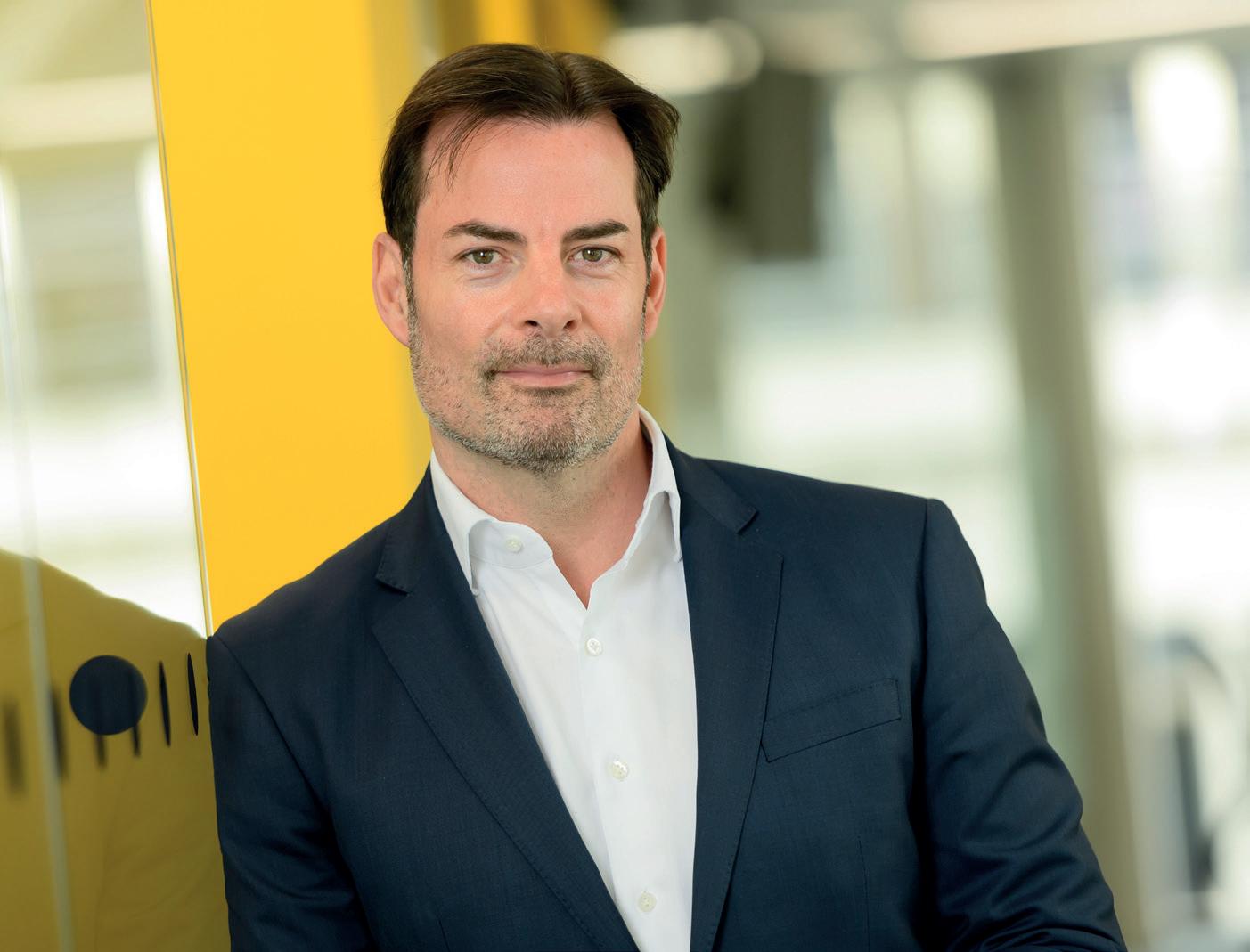

Aldermore’s foundation lies in backing individuals and businesses often overlooked by mainstream finance. This ethos resonates across its efforts, from supporting SMEs to aiding first-time buyers with complex credit histories. Initiatives like revamped mortgage products for underserved demographics and tailored financing for self-employed workers highlight the bank’s dedication to breaking down financial barriers.
The report underscores the bank’s investment in apprenticeships and future skills development, with £330,000 invested in upskilling a diverse workforce. Programmes like ‘Embrace Your Future’ not only empower employees but also contribute to social mobility critical in a country grappling with entrenched inequalities.
In an era where local economies face increasing strain, Aldermore’s support for regional growth stands out. The £88 million socio-economic impact generated through its partnership with Norwich City Football Club demonstrates the tangible value of purposeful investment. By backing SMEs like Chiltern Transport and Warehouse, Aldermore enables businesses to thrive, creating ripple effects of innovation, job creation, and resilience.
In 2024 alone, Aldermore positively impacted nearly 9,000 individuals through targeted financial wellbeing initiatives. Collaborations with organisations such as The Money Charity amplify its mission to improve financial literacy. These partnerships have delivered workshops to thousands of young people and adults, equipping them with essential skills to navigate an increasingly complex financial world.
Internally, the launch of a Money Coach benefit programme reflects the bank’s holistic approach to wellbeing, addressing the financial and mental health needs of its employees. Initiatives like these set a benchmark for how businesses can care for their workforce in meaningful ways.
Aldermore’s commitment to a sustainable future is evident in its net-zero targets for operational and financed emissions. With ambitious plans to
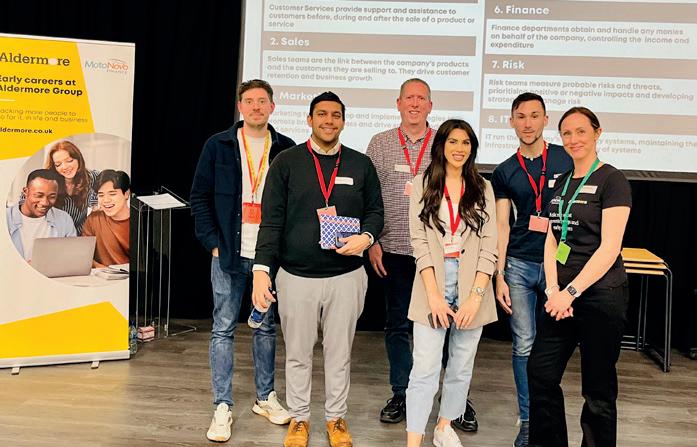
decarbonise property and motor finance portfolios, the bank is actively engaging in the energy transition. Partnerships with organisations like Kexgill Group on sustainable housing projects showcase its innovative approach to tackling the climate crisis.
The recycling and e-waste initiatives highlight its commitment to environmental stewardship. By donating refurbished laptops to underserved communities, the bank addresses both environmental and digital divides, a dual impact that encapsulates the spirit of purpose-led action.
Inclusion is a cornerstone of Aldermore’s strategy, with bespoke products designed to meet the needs of marginalised groups. From supporting first-time buyers with poor credit to funding buy-to-let landlords investing in energy-efficient properties, Aldermore is redefining access to financial services. Its efforts in widening access to savings products, such as the introduction of a Regular Saver account, encourage responsible financial habits and economic resilience.
As the UK grapples with economic uncertainty and social inequality, Aldermore Bank’s Report to Society is a timely reminder of the private sector’s potential to lead positive change. By embedding purpose into every aspect of its operations, Aldermore not only builds trust with its customers but also inspires a broader rethinking of corporate responsibility. As Aldermore marks 15 years of impact, it stands not just as a financial institution but as a catalyst for change. Its journey underscores an essential truth: when businesses align profit with purpose, the results can transform lives, communities and the future.

When Parliament returned for 2025, Prime Minister Keir Starmer – just six months into the job – kicked off the year by announcing a new Elective Reform Plan, aimed at addressing NHS waiting lists.
The government says it will introduce national standards for elective care, providing patients with clear expectations and identifying areas where performance falls short.
Despite peaking in late 2023, waiting lists in England remain at a record level – sitting at 7.54m. The Prime Minister’s new plan follows the Chancellor Rachel Reeves’ £22bn increase to health and social care spending in her first budget, with the government aiming to ensure 92% of patients wait no longer than 18 weeks for elective treatment.
Central to the plan is the expansion of Community Diagnostic Centres (CDCs) and Surgical Hubs. These facilities aim to separate planned care from the pressures of emergency services and seasonal demand. Currently, 165 CDCs operate in various locations, including shopping centres and university campuses, with further expansion planned. Surgical hubs, described as “hospitals within hospitals”, will focus on planned surgeries using dedicated resources and staff.
In a speech in Epsom, the Prime Minister also spoke of the need to make greater use of technology. Patients will be able to use the NHS App to book appointments, view test results, and check waiting times. The app will offer the ability to choose appointment locations, with an emphasis on providing more transparency and convenience. Artificial intelligence will also be deployed to predict missed appointments, while wearable technology will allow for remote monitoring, reducing the need for in-person consultations.
Changes to patient care pathways are also highlighted in the plan, including group appointments for patients with
long-term conditions and one-stop clinics designed to carry out assessments, diagnoses, and treatments on the same day. Patients will also have the option to decline some follow-up appointments, freeing up over a million appointments annually, according to government estimates.
Furthermore, the government has also secured an agreement with the independent healthcare sector to help reduce waiting times further. This collaboration will target areas with high demand, such as orthopaedics and gynaecology. Plans include standardising digital systems across the NHS and private providers to give patients a clearer choice of appointments. There is also an emphasis on workforce development, with training initiatives designed to grow capacity in the elective care workforce.
The government says it will introduce national standards for elective care, providing patients with clear expectations and identifying areas where performance falls short. NHS Trusts making the most progress in reducing waiting times will receive additional funding for local improvements, such as new equipment or ward maintenance.
Whether the plan will achieve its ambitious targets remains to be seen. With pressure mounting on the NHS to recover from the effects of the pandemic and ongoing workforce challenges, its success will likely depend on effective implementation and sustained investment.

A future where good health is within everyone’s reach must be a key priority for the UK. EMS Healthcare CEO Dr Clare Grace is bridging personal commitment with professional expertise to address health inequality across the nation.
For the last 25 years, I’ve devoted my life to R&D, first in biotech, then pharma, and eventually with global clinical research organisations. I’ve spent the majority of my time working the clinical phases of R&D and I’ve always loved it.
My role was always about working very closely with clinical research sites and trying to understand how we could make continual improvements. During that time, most clinical research has been – and still is – conducted at hospital sites. But staying wedded to that approach is missing an enormous opportunity. That became abundantly clear to me when I first heard about the company I’m now privileged to lead, EMS Healthcare. As I did my research, I was just astonished at what it had achieved, providing health awareness and capacity for the NHS and supporting some of the largest clinical research studies run in the UK.
There’s so much more we could do to support patient access to treatment, support, screening, and preventative medicine. Our focus is using a fleet of mobile clinical units to remove barriers to access for underserved communities. They can be set-up anywhere, which means we’re perfectly poised to drive – literally – healthcare into communities that traditionally just don’t normally have access.
The benefits are significant. You can increase diversity within clinical trials and reach new participants, who would never usually take part. And, in turn, you can create a new paradigm of clinical research. You’re also relieving pressures on the NHS for everything from vaccine rollouts through to sexual health services, cancer screening, or supporting those who are experiencing homelessness.
The same theory applies in so many other areas. I recently read a report by The University of York, estimating the cost of diabetes to UK is £14 billion. The study showed that just over 40% of costs were related to diagnosis and treatment, with the rest, at just over £6 billion, relating to excess costs of largely preventable complications. Diabetes care in the UK is incredibly disjointed, inconsistent and inaccessible to many.


Getting into communities in more diverse ways is so beneficial to both the healthcare system and our country’s health outcomes. I’m incredibly proud of the role we play at EMS Healthcare in supporting communities and easing the strain on NHS services in primary care, secondary care and emergency departments.
Our mobile outreach clinics bring essential health services closer to people’s homes, offering patients a convenient alternative - not only improving access to care and reducing health inequalities, but also helping to alleviate the overwhelming pressure on emergency departments.
It’s a mission that is aligned with the current government priorities. Shortly after becoming Health Secretary Wes Streeting said “I’m determined to make the NHS more of a neighbourhood health service, with more care available closer to people’s homes. Because if patients can’t get a GP appointment, then they end up in A&E, which is worse for them, and more expensive for the taxpayer.”
Addressing key health equity challenges by bringing healthcare and clinical research services directly to communities is a personal motivation of mine and aligns perfectly with EMS Healthcare’s vision. With our unique ability to support from discovery to delivery, we are fostering greater inclusion in clinical research, improving access to healthcare, and helping the NHS move towards a preventative care model that benefits everyone.
“When you enjoy what you do, you keep doing it”
–
SOUTHEASTERN STATION SUPERVISOR
CELEBRATES 55 YEARS OF WORKING ON THE RAILWAY
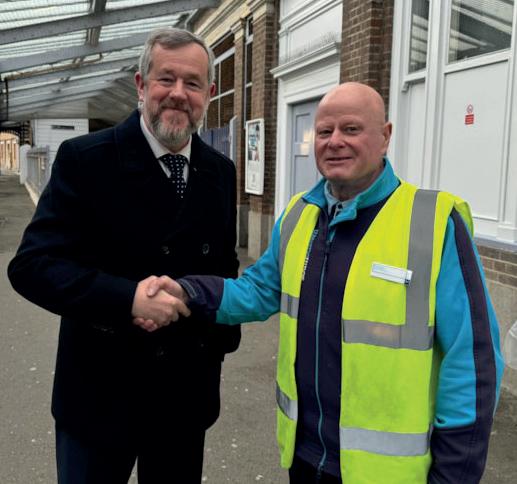
DOUGIE CALDER WAS 16 WHEN HE JOINED BRITISH RAIL IN 1969.
His long service was recognised at a special event with current and former colleagues. Southeastern bosses praise his commitment and encourage others to consider a career in the rail industry.
A station supervisor at Margate has celebrated his 55th anniversary of working on the railways.
Dougie Calder was 16 when he joined British Rail in 1969 and has spent more than five decades in a range of roles.
He started as a junior porter at Margate. He was promoted to be a railwayman and a shunter, before moving to Ramsgate to become a conductor. He later returned to Margate to work at the station.
The 71-year-old from Broadstairs is showing no signs of slowing down. He still cycles to and from work and regularly works 12-hour early, late, and night shifts.
Reflecting on his career, he said:
“When you enjoy what you do, you keep doing it. I’ve enjoyed all the jobs I’ve had on the railway.
“I’ve seen many things change over the years. When I started, I had to get under dirty trains to couple the wagons, but they’re now gone. Slam door trains have also been replaced with highspeed trains and it’s amazing how much that transformed the service.
“I’ve had so many opportunities and I’m lucky to have worked with so many characters. I’ve been very lucky to have achieved everything I have on the railway, and I have no plans to retire all the time I’m healthy.”
His long service was recognised at a special event attended by former and current Southeastern colleagues on Friday, 6 December.
The coin collector was presented with a coin engraved with the date he joined the railway.
David Wornham, Southeastern’s Passenger Services Director, said:
“Dougie’s passion and his commitment to the railways in Kent over his career has been remarkable. He’s hugely popular among his colleagues and the many customers he’s served over his 55 years.
“He is a real-life example of how the railway can be a career for life – and as we look forward to the 200th anniversary of the railway in 2025, I hope his story inspires a new generation to join us.”
Working on our railway is more than getting passengers from A to B.
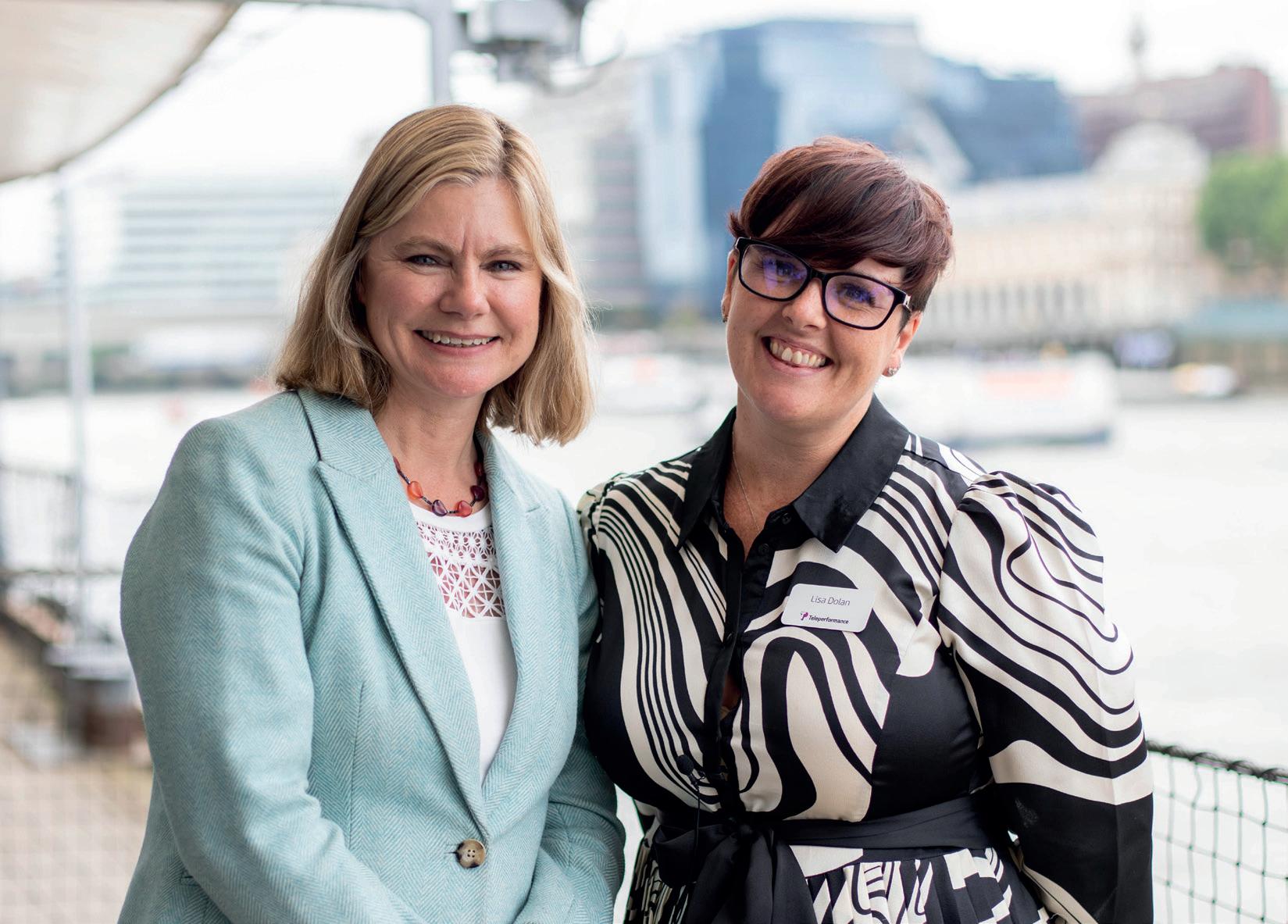
At the Purpose Coalition, we are driven by a commitment to foster a generation of business leaders equipped with the skills, perspectives, and social awareness needed to tackle today’s complex challenges.
Our latest initiative, The Purpose Lab, expands on our successful Student Ambassador Programme, creating a powerful platform where young voices contribute directly to shaping responsible business strategies and social impact projects. Notably, the Student Ambassador role is a paid position, ensuring that students’ insights and contributions are valued.
The Purpose Lab partners students from Purpose Coalition universities, and over the coming weeks
colleges, with some of the UK’s leading organisations. It offers real-world experience that bridges the gap between academic studies and industry practices.
With access to these diverse perspectives, our business members gain fresh, innovative solutions to pressing social and business challenges. This collaboration is crucial not only in empowering students but in helping businesses build socially conscious, inclusive, and forward-thinking strategies.
Rt Hon Justine Greening, Chair of the Purpose Coalition, sees The Purpose Lab as a catalyst for transformative change. “We need to bring diverse voices into decisionmaking processes to build a fairer, more inclusive society,” she said. “The Purpose Lab provides a unique platform for students to bring their lived experiences to the table, allowing businesses to see the issues they face in new ways. This initiative ensures that these young people can actively shape the solutions we need.”
Nick Forbes CBE, Chair of the Breaking Down Barriers Commission, echoes this vision, emphasising the importance of breaking down traditional silos in business. “Our society’s most pressing issues are often best understood by those closest to them,” he said. “The Purpose Lab’s approach of engaging students in corporate decision-making processes is a groundbreaking way to harness their insights, shaping a more diverse and dynamic future workforce.”
The recent Purpose Lab session welcomed Lisa Dolan, Regional VP of Employee Experience UKISSA at Teleperformance, a global digital business services company that provides customer care, technical support, and other specialised services to some of the world’s leading brands, whose personal and professional journey provided a powerful example of resilience and achievement. Reflecting on her own experiences, Lisa shared, “It’s not until you look back on your journey that you appreciate how each challenge, each role, and each success has built you up. Starting as a call centre agent to now serving as a VP, I want students to know that there are endless possibilities if they remain determined and open to change.”
They gain fresh ideas, new perspectives, and innovative solutions that help them to stay relevant and socially conscious.
Lisa’s story resonated with our student ambassadors, who gained a unique perspective on navigating career challenges and embracing their individual paths. Her encouragement to embrace every experience, overcome obstacles, and stay curious about the future offers invaluable guidance for young people at the start of their careers.
Another inspiring example of engagement with The Purpose Lab is Southeastern’s recent involvement. By offering a summer work placement to three Purpose Coalition student ambassadors, Southeastern has demonstrated a commitment to nurturing future leaders. This placement was more than just work experience, it was an opportunity for the students to see how purpose-driven strategies can be implemented within the corporate environment, gaining firsthand insights into the inner workings of a socially responsible organisation.
In a political climate that increasingly recognises the need for community engagement and diverse voices, initiatives like The Purpose Lab are more relevant than ever. Recently, the new government outlined its support for community assemblies, underlining the importance of diverse perspectives in decision-making. The Purpose Lab aligns perfectly with this call to action by integrating students’ insights into business strategies, building community-minded approaches and fostering social mobility from within.
By collaborating with Purpose Lab, organisations not only empower future leaders but also contribute to the development of an inclusive and diverse future workforce. They gain fresh ideas, new perspectives, and innovative solutions that help them to stay relevant and socially conscious.
The Purpose Coalition invites more organisations to join us in this vital initiative. As Lisa Dolan highlighted, “Engaging with Purpose Lab is a chance to help students realise their potential while sparking change in our own organisations. Their ideas and insights are not only inspiring but vital to the future of responsible business.”
a second job to support her family
now she couldn’t be prouder in her role as Assistant Hotel Manager
Travelodge, the UK’s first budget hotel chain with over 600 hotels across the UK, Ireland and Spain, is proud to have a diverse and inclusive workplace, and fully embraces and respects its colleagues’ differences, which the company believes should be celebrated.
As a major employer in the UK, and in the hospitality industry, Travelodge takes its commitment towards social mobility seriously, and believes it can really help people to fulfil their potential. In March 2024, a Social Mobility Manager was appointed to identify key actions that will enhance Travelodge’s ambition to continue to create equality of opportunity.
Abbey Mumtaz’s upbringing was far from easy. As one of six siblings living with her parents and her nieces and nephews, life at home, in a three bedroom flat, was often chaotic. This was made all the more difficult when, at the age of 11, Abbey’s mother was diagnosed with breast cancer and Paget’s Disease. Abbey says that the news took a “mental, physical and financial” toll on her whole family which resulted in her parents selling drugs to make ends meet and eventually both becoming drug users.
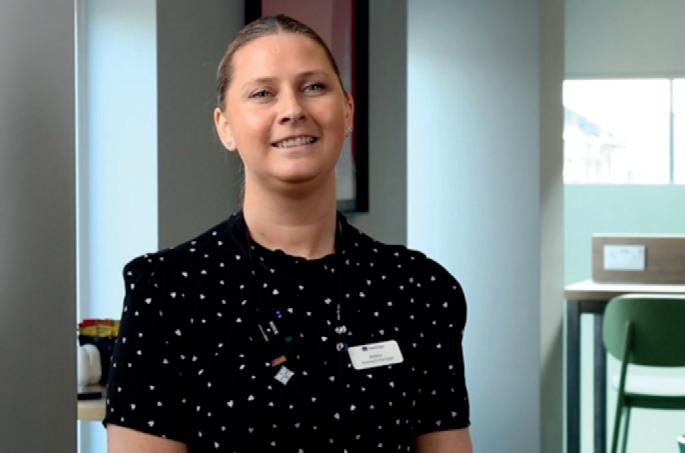
Despite a difficult upbringing, Abbey was determined to find work and support herself. She worked a number of different jobs before getting married and starting a family, eventually joining Travelodge in March 2022, working in the Bar Cafe. Incredibly, a little over a year later Abbey had been promoted to the role of Assistant Hotel Manager at Travelodge Walthamstow, and is now on her way to completing the Travelodge’s in-house management programme called Aspire*.
Abbey has praised colleagues and former managers for seeing potential in her that she could not see in herself and says that she “could not be prouder” of who she is today.
Travelodge works in partnership with The Purpose Coalition - a coalition made up of organisations who are working to break down barriers to opportunityto support the cross party plans for social mobility by participating in roundtable discussions with government representatives in order to help shape social policy.
What was your upbringing like?
I grew up in a three-bedroom flat with my parents, six siblings and my nieces and nephews - at one point there were ten of us living in the flat and my parents were sleeping on the living room floor. I was 11 when my mum was diagnosed with breast cancer and Paget’s disease, which put further strain on my family.

My parents were under a lot of financial pressure and resorted to selling and then using drugs. Despite this, we never went without, but, as I’m sure people can imagine, it was not nice growing up in that environment. We almost went into foster care and, as I got older, I rebelled and was removed from school which meant I missed out on taking my GCSEs. I later enrolled in college to sit these as I really wanted to go into hospital nursing, but that didn’t work out as life had other plans for me! I fell pregnant when I was 16 and in April 2009, a few weeks before my 17th birthday, I gave birth to a baby boy. He was my saviour at a time when I needed guidance. I gave birth to my second child, a daughter, when I was 19.
What were you doing before working with Travelodge?
Before joining Travelodge I was doing the odd cleaning jobs and kiosk work at football matches, before becoming an Admin Assistant in 2015 at a mechanical garage. In 2018, I met my now husband and my life felt like it was all starting to finally go in the right direction - I had my children, my partner and work was going well! However, in 2021 my husband was knocked off his motorbike, meaning he was unable to work due to his injuries. We had our wedding booked for late 2021 but unfortunately it had to be postponed to 2022.
When did you join Travelodge?
I joined Travelodge in March 2022, working evenings in the Bar Cafe at Thurrock, Lakeside - I was working two jobs at the time to try and give my family what they deserved and to also pay for our upcoming wedding, which took place in May that year. After I got married, my Manager approached me and asked me if I would be willing to stay with the company - they said that they could really see my potential.
Were you allowed to work flexibly?
I was really keen to stay with Travelodge, but even more so after I became aware that Travelodge offered flexible working, which is so desperately what I needed. I also loved the variety the role offered, such as the flexibility to work one morning on reception and one evening in the Bar Cafe, Travelodge’s on-site restaurant. In December, the Manager of my hotel decided to leave the business and that’s when my Area Operations Manager (AOM) approached me to see If I would like to train as an Assistant Hotel Manager. I was over-the-moon. I couldn’t believe that I had been given this opportunity and that someone was able to see my potential even if, at the time, I couldn’t.
Travelodge has always been supportive of a healthy work-life balance for its colleagues – whether that be working parents who need flexible hours that fit around the school run and holidays, students who choose to work at both their home and university locations, colleagues who simply wish to step back, as well as those looking to reach other goals alongside their working commitments.
What has your progression at Travelodge looked like?
I gave up my other job and I took on the role, full-time, as a Travelodge Food & Beverage Supervisor in February 2023. Incredibly, by April I was promoted to Assistant Hotel Manager (AHM) and started my new role at Beckton Travelodge. Later that year, I took on the role as Assistant Hotel Manager at London Walthamstow Travelodge, where I am still working now.
I have a lot of people to thank for pushing me into a career that I never dreamed I could do, but that I now absolutely love! I had colleagues who took the time to train me, and others who have pushed me to now prove that I can run a hotel, achieve great customer feedback and reviews and deliver a brilliant base for our guests!
My journey from Team Member to Assistant Hotel Manager was just over a year, and I couldn’t be prouder of the person I am today and the life that I can give to my family!
What is the Travelodge Aspire Programme and how have you benefited from it?
Aspire is Travelodge’s In-house Management Development Programme which has helped thousands of colleagues to progress their career from an entry level position into management. Since the launch of the Aspire Programme, many individuals, like me, have joined and worked their way into more senior positions. I would recommend the Aspire programme to any of my colleagues at Travelodge who have the opportunity to apply. I completed Aspire 1 recently and am currently working my way through the rest of the Travelodge Aspire Programme, which is so exciting!
Travelodge is fully committed to providing a flexible job structure as part of its ‘Find Where You Belong’ company initiative, which ensures inclusivity, support and flexibility for all its colleagues to be their true self at work and to belong.

Sam Bone has been with Ramsay Health Care UK at the Yorkshire Clinic for two and a half years. He is currently studying to become an Operating Department Practitioner (ODP) through the Ramsay UK apprenticeship programme. This three-year course allows him to complete his degree while working full-time. As part of his role, he works as an Anaesthetic Practitioner, ensuring that the Anaesthetists have all the support they need, as well as monitoring patients during and after surgery. He also acts as a Scrub Practitioner, directly assisting the Surgeon throughout surgery.

For Sam, one of the most rewarding aspects of his job is the people he works with. His mentors are highly experienced and excellent at what they do, and the entire team is incredibly supportive of both his university studies and his commitments to the army.
Sam’s journey into healthcare was not a conventional one. During his application to join the Armed Forces as a full-time Officer, he took a job as a cleaner in theatres at the Yorkshire Clinic. Over time, as he became familiar with the theatre staff, they recognised his potential for a career in healthcare and encouraged him to apply for a role as a Healthcare Assistant. Not long after, an opportunity arose for him to apply for the ODP apprenticeship scheme. It was at this point that he decided to adjust his application with the army, opting instead to become a Reservist in the Royal Army Medical Corps. This decision allowed him to pursue a civilian career in theatres while simultaneously training as a soldier.
Being a Reservist has given Sam the unique opportunity to experience both army life and a civilian career. His role in the Royal Army Medical Corps mirrors his responsibilities at Ramsay, enabling him to apply his skills in different environments and with different teams. He values the opportunity to observe how others work differently and adapt his practice accordingly to suit different situations.
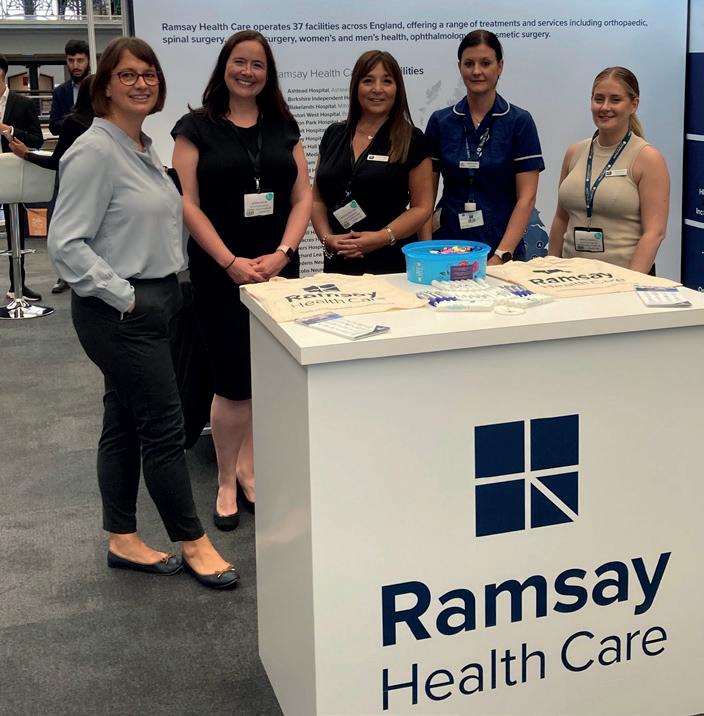

Additionally, the training he receives in the army has equipped him with valuable experience in handling emergency scenarios. This training enhances his ability to react quickly and effectively in high-pressure situations, a skill that is crucial in both his military and civilian roles. The combination of these experiences allows Sam to continuously develop his clinical expertise and improve his adaptability within the operating theatre.
Looking back, Sam is grateful for the support and encouragement he has received throughout his journey. The mentorship and guidance from his colleagues at the Yorkshire Clinic have been instrumental in his professional development. He is also appreciative of the opportunities provided by Ramsay Health Care UK, which have allowed him to gain hands-on experience while studying for his degree.
Sam’s story is a testament to the importance of career progression and personal growth. His ability to balance his civilian and military responsibilities demonstrates his dedication and passion for healthcare. With a bright future ahead, he remains committed to both his professional development and his service in the Armed Forces, proving that with determination and the right support, it is possible to excel in multiple career paths simultaneously.

“If there’s one word that encapsulates Clyde & Co for me, it’s the word opportunity. This programme is all about extending opportunities to others. By having a much wider talent pool, both wide and deep in terms of social and education background, we are much more likely to get innovative and flexible thinking, which is highly important to our clients.”
ANDREW NICHOLAS, PARTNER, GUILDFORD
“It’s not just looking at a very narrow selection of universities or schools. It’s looking to be more reflective of society. I know that the senior leadership team across Clyde & Co internationally is very committed and supportive of this programme, and I’m very pleased to be part of it.”
ANDREW KERR, PARTNER, MANCHESTER
“Having the ability to adapt every part of the programme to address potential barriers to entry meant we attracted aspiring professionals who may otherwise have struggled to get their foot in the door. The insight weeks were a pleasure to be a part of and really showcased the incredible talent looking for that first insight opportunity to the sector.
I’m very proud to work for a firm that has made space for a program like LIFT, as it demonstrates our genuine commitment to making legal careers more accessible and the value Clyde & Co sees in having greater socio-economic diversity across our industry.”
MELEESHA PERERA, SENIOR DEI ADVISOR, LONDON
Clyde & Co’s LIFT (Legal Insight for Future Talent) programme is a pioneering initiative aimed at enhancing social mobility and diversity within the legal profession. Launched in early 2024, LIFT seeks to provide equitable access to legal careers for individuals from underrepresented backgrounds, addressing the traditional barriers that have long existed in the sector.
The LIFT program is structured around five-day hybrid insight weeks, combining virtual workshops, mentoring, and in-person networking sessions. By introducing a simple application process, broad age eligibility and no grade requirements, focus is placed on individual strengths, enthusiasm and an interest in the legal sector. Participants receive compensation above the living wage, with all expenses covered including accommodation where needed, ensuring that economic constraints do not hinder participation. The program is accessible across the UK, with in-person sessions held in cities such as London, Manchester, Birmingham, Bristol, and Edinburgh.
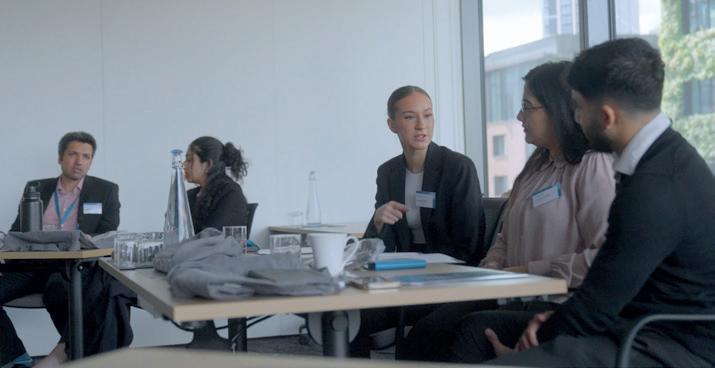
A key component of LIFT is its focus on personal development and career planning. Participants engage in activities designed to:
Improve Application Skills: Enhancing confidence and ability to submit stronger applications.
Identify Career Interests: Exploring both legal and business services to clarify career goals.
Enhance Networking Confidence: Engaging in professional networking with support and coaching.
Collaborate Effectively: Working in teams on real legal casework, culminating in presentations to firm partners.
The impact of LIFT is evident in the feedback and testimonials of its participants:
97% of participants stated they would be more likely to apply to Clyde & Co after this programme.
98% of participants stated the LIFT Insight Week was a valuable experience which will benefit their progress in applications within the sector.
95% of participants felt they improved their understanding of the skills and qualifications needed to work in the legal sector.
92% of participants felt the program was inclusive to their individual needs.
Christian Morris, a LIFT Black Heritage participant, shared: “I’ve cultivated a network of professionals committed to improving diversity in the legal sector.”
Stephanie Choi, a LIFT Social Mobility participant, noted: “The casework exercise built my skills in teamwork and legal research. It was an incredible experience.”
LIFT complements Clyde & Co’s existing initiatives aimed at addressing under-representation in the legal sector. This includes partnerships with non-Russell Group universities, ring-fenced programmes such as Bright Futures, and the use of contextualized recruitment across all Early Careers applications.
The firm’s proactive approach to fostering social mobility and diversity offers valuable lessons for all industries, including Insurance. By championing initiatives like LIFT, Clyde & Co demonstrates a commitment to building a more inclusive industry and ensuring equitable opportunities for all.
Clyde & Co’s LIFT programme represents a significant step toward breaking down barriers in the legal profession. By providing accessible, comprehensive, and supportive pathways into legal careers, LIFT not only benefits its participants but also contributes to the broader goal of creating a more diverse and inclusive legal sector.
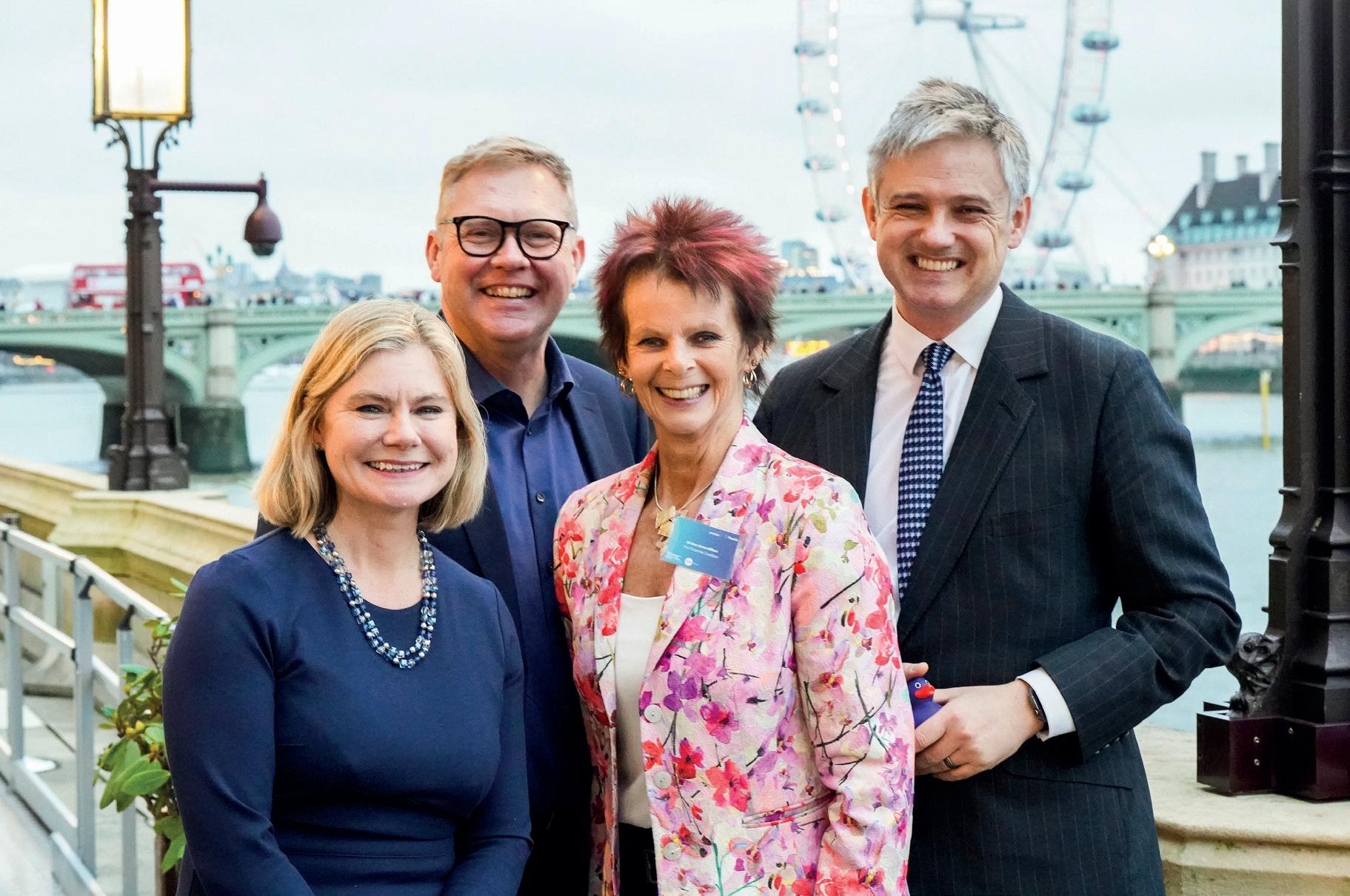
By Mark Hulsmeier, Client Services Director, The Purpose Coalition
As 2024 comes to a close, it’s a great time to reflect on what’s been an incredible year for the Purpose Coalition.
It’s been a year full of collaboration, innovation, and a shared commitment to making a real difference across the UK. We’ve seen the Coalition continue to grow, bringing together partners from various sectors to tackle some of the biggest challenges society faces today.
One of the highlights of the year happened on Monday 9th December, when the Purpose Coalition hosted a reception in Parliament. We teamed up with Anchor, England’s largest not-for-profit housing and care provider, and Plentific, a leading property tech platform, to celebrate their game-changing digital housing partnership. Their collaboration aims to improve the living experience for Anchor’s 65,000 residents by streamlining property services through smart technology.
This partnership really reflects what the Purpose Coalition is all about: using innovation to create lasting social impact. With Plentific’s cutting-edge platform, Anchor can respond to residents’ needs faster and more efficiently. It’s a great example of how tech can improve lives and strengthen communities.
The reception brought together a fantastic mix of people, including representatives from Enterprise Mobility and Clyde & Co. Seeing such a diverse group committed to positive change was truly inspiring. It was a chance to celebrate achievements, build new connections, and share ideas with MPs, business leaders, and like-minded changemakers.
As we head into 2025, we’re excited to keep building on this momentum. With new partnerships, fresh ideas, and an unwavering commitment to positive change, we’re ready to push even further.
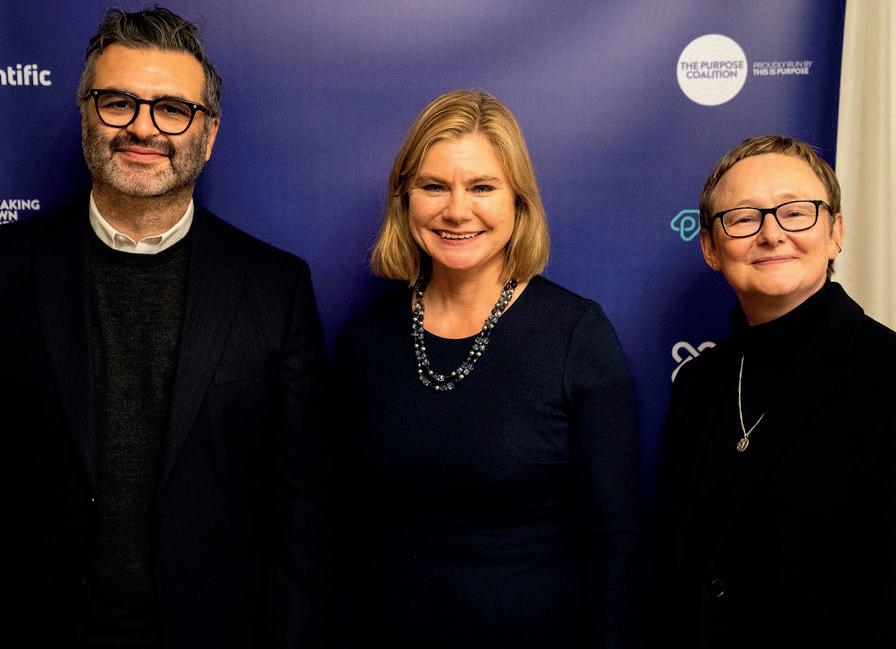

Driving Progress in Health and Education 2024 also saw some incredible work in healthcare. NHS Trusts like Shropshire Community Health, South Warwickshire University NHS Foundation Trust, and Kent and Medway NHS and Social Care Partnership Trust have been leading the charge. Their innovative approaches to integrated care and patient-first services are making a real difference in reducing health inequalities and improving access to essential care in the communities they serve.
Education has also been front and centre of our work this year. College groups like NCG and Capital City College have pushed the boundaries with new programmes aimed at improving opportunities for students from underrepresented backgrounds. By building strong partnerships with employers and communities, they’re helping young people develop skills and create better futures.
Looking back on 2024, it’s clear that Purpose Coalition partners have achieved a lot—but we’re just getting started. The progress we’ve seen shows that breaking down barriers isn’t just a goal—it’s something we can make happen together.
As we head into 2025, we’re excited to keep building on this momentum. With new partnerships, fresh ideas, and an unwavering commitment to positive change, we’re ready to push even further. Together, we’ll continue working toward a fairer, more inclusive society—one step at a time.
Together, we’ll continue working toward a fairer, more inclusive societyone step at a time.
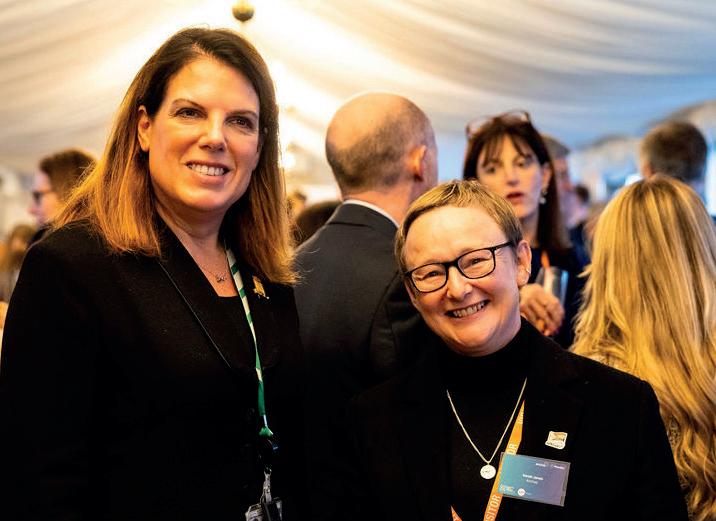
Last week, Carolyn Harris MP, Member of Parliament for Neath and Swansea East, hosted a parliamentary reception at the House of Commons. Organised together with Sodexo UK & Ireland and The Purpose Coalition, the event highlighted the transformative potential of hiring ex-offenders and how businesses can drive greater employment opportunities for this untapped talent pool.
During the reception, Mark Goodyer, HR Director, Sodexo UK & Ireland welcomed Rt Hon Justine Greening, Chair of The Purpose Coalition, who announced a new collaboration between The Purpose Coalition and Sodexo’s Starting Fresh programme.
Launched last year, Starting Fresh provides proactive steps for more businesses to recruit candidates directly from prisons, creating more sustainable employment opportunities which are essential for successful reintegration into society.
The partnership announced last week, aims to extend the programme’s reach by uniting organisations within The Purpose Coalition that are committed to breaking down barriers to employment. Together they will work towards hiring more prison-leavers and people with criminal convictions.

As part of this collaboration, The Purpose Coalition will lead new research to gain insights from those in the justice system on how employers can better support them into work at the end of their sentence. This research will be conducted using the Purpose Coalition’s Community Assembly model. These assemblies are designed to empower prisoners by directly involving them in discussions about their barriers to employment and rehabilitation. Participants will identify key challenges, propose practical initiatives, and provide actionable recommendations for employers and policymakers. The findings will help shape future work programmes that address need, enhance rehabilitation, and aim to reduce reoffending. At the heart of the project is ensuring that the voices of those furthest from opportunity are at the heart of potential solutions.
Across the UK, more than 11 million people hold a criminal record, many of whom face significant barriers to finding employment despite having the potential and drive to contribute meaningfully to the workforce. With over one million job vacancies across the country, this untapped talent pool represents a key opportunity to address workforce challenges while driving social impact.
Speaking at the reception, Tony Simpson, Justice Chief Operating Officer, Sodexo UK & Ireland, emphasised the importance of removing barriers to employment: “We believe in the power of business to drive social mobility and be a force for good. As the operator of six prisons across the UK, we see first-hand the transformative impact that meaningful employment can have on individuals leaving the justice system. Our prison employment leads work with a wide range of employers to create sustainable jobs, helping people rebuild their lives.
“Through our longstanding partnership with The Purpose Coalition, we aim to unite more purpose-driven businesses to create further opportunities and continue to challenge perceptions.”
Rt Hon Justine Greening, Chair of The Purpose Coalition, added: “Today’s announcement marks an important milestone in our mission to ensure that opportunity is accessible to everyone. By integrating the expertise of Sodexo’s transformative Starting Fresh programme with
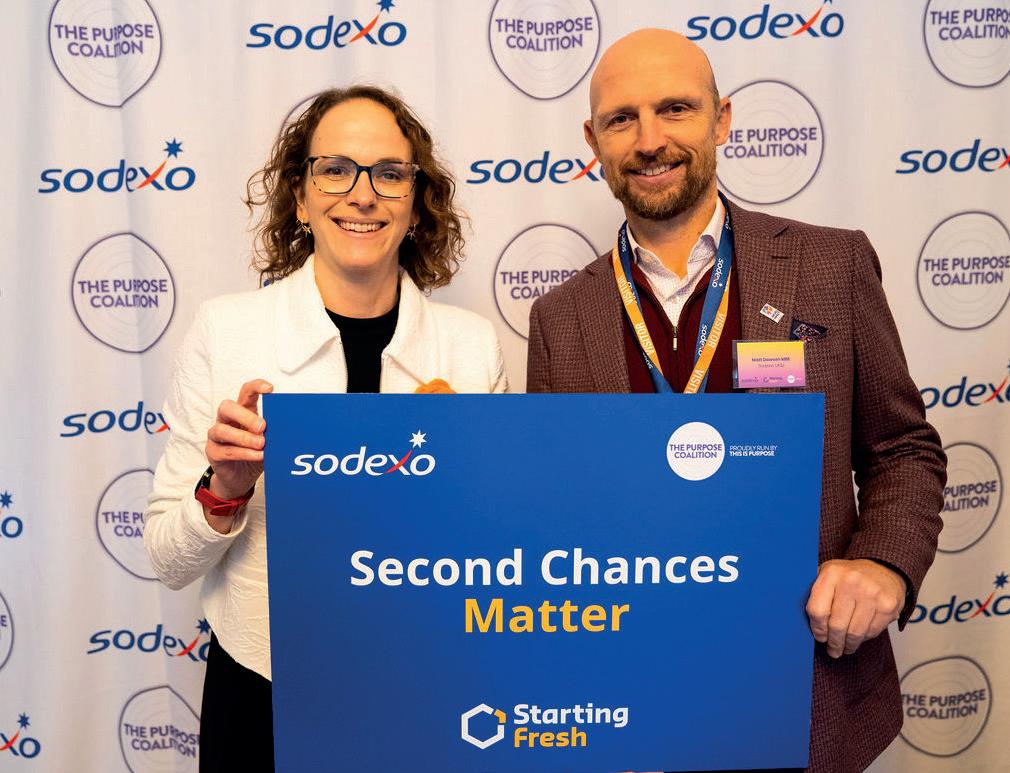
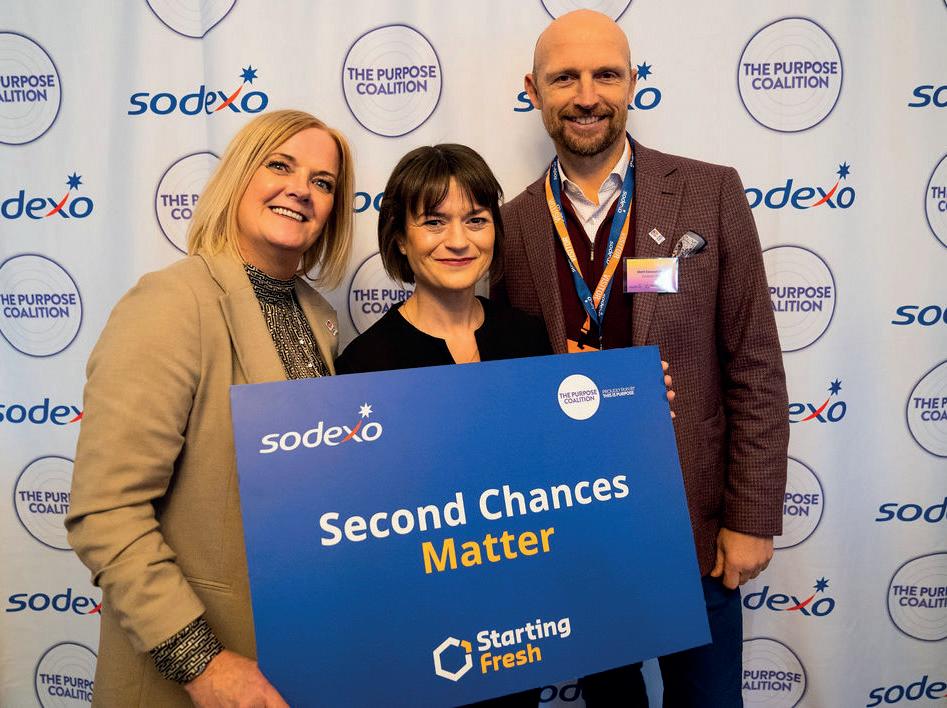
The Purpose Coalition, we are aiming to reach even more employers committed to delivering real social impact for individuals, including those leaving the justice system.”
The collaboration was inspired by a visit to the Sodexorun HMP Addiewell prison earlier this year by Purpose Coalition leaders, including Engagement Director, Lord Walney. This visit showcased the positive impact being created by Sodexo’s Starting Fresh programme and highlighted opportunities to enhance rehabilitation through strategic partnerships.
The event at the House of Commons underscored the necessity of initiatives like Starting Fresh in supporting the government’s plans to break down barriers to opportunity for all. By providing guidance to employers and policy makers on proactively hiring individuals with criminal convictions, the programme addresses common misconceptions and highlights the valuable contributions these individuals can make to the workforce.
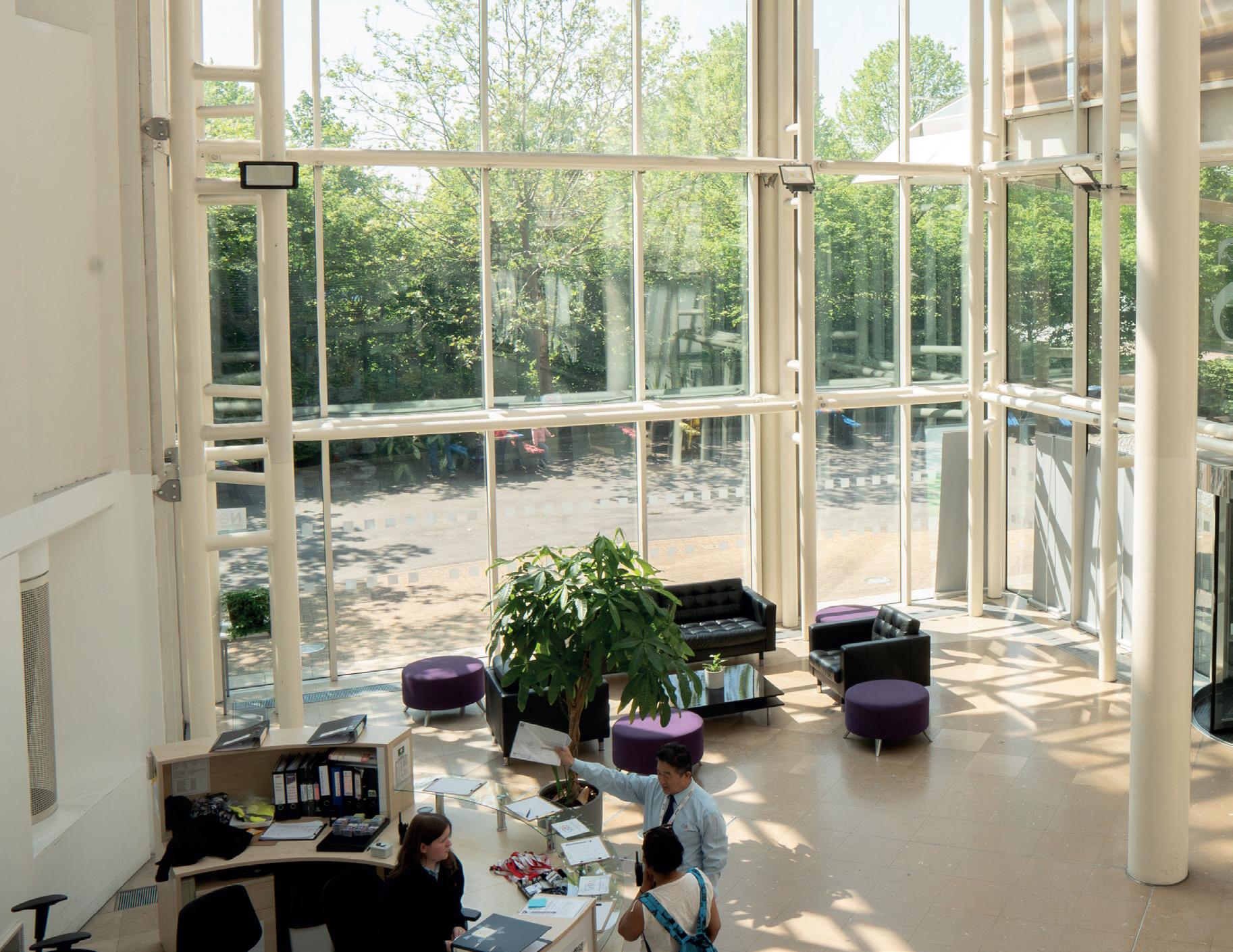
Widening participation, addressing skills shortages and enabling social mobility are critical in ensuring communities in the UK and around the world can generate positive and sustained growth. Ultimately, education is at the core of this endeavour.
Global Education (GEDU) is a value-driven organisation, meaning we truly care for our students. High-quality education is our sole focus and we always put people over profit, as delivering a positive learning experience for as many students as possible will encourage others to study and lead to a transformative effect.
The group currently encompasses thirteen educational organisations and operates in twelve countries.
For GEDU, two major points that need addressing are widening participation and addressing critical skills shortages.

The list of courses across the portfolio demonstrates a commitment to addressing skills gaps in the market across construction, healthcare and other sectors demanding a job-ready workforce.
Global Banking School (GBS), one of the institutions under the GEDU umbrella, is doing this successfully across the UK, currently operating in five locations: Birmingham, Leeds, East London, West London and Manchester.
GBS provides high-quality educational opportunities to more than 35,000 students, students who are usually excluded from accessing higher education. Our students are generally older, with a median age of 37, and have missed out on the chance to further their education for a variety of reasons. They come from the most deprived communities, have significant caring responsibilities and need to work to provide for their families. These characteristics make accessing traditional universities nigh on impossible for our students. To overcome this GBS has developed a distinctive way of operating.
We offer multiple delivery patterns that allow our students to choose a pattern that works for them.
Generally, in UK HE, students need to adapt their lives to the rhythms of a university, but this doesn’t work for our students with their busy and complex lives. At GBS we take a different approach, designing programme delivery around our students. We offer multiple delivery patterns that allow our students to choose a pattern that works for them. Crucially, our students know that their pattern of in class study, typically two days or three evenings a week, including the possibility of weekends, will not change in their four years with us. This enables them to plan their studies around their work and caring responsibilities.
GBS also recognises that our students need significant support and encouragement as they balance the rigours of studying with the demands of their daily lives. For instance, every time a student is absent from class they will be called on the same day so that we can understand the reason for absence and help them resolve any problems. Overall, more than 10% of GBS staff are involved in this first line student support.
This flexible and caring model means students can always make it to their classes, earn a qualification and ultimately take that next step in their career.
More broadly across the GEDU Group, different institutions on different sides of the globe are working innovatively to address skills shortages.
If people are empowered to learn and gain qualifications, they will go on to better jobs, earn more money and spend it in their local communities. This benefits businesses and ultimately results in long-term growth and prosperity, changing lives for the better.
Professor Ray Lloyd, Deputy CEO of GEDU

Why do some people think
At the Spectator’s Annual Parliamentarian of the Year awards just before Christmas 2024, Nigel Farage was crowned ‘Newcomer of the Year’ by the historic magazine.
Towards the end of his speech, Farage said “At the next election in 2029, there will be hundreds of newcomers under the Reform UK label”, going on to add that ‘we are about to witness a political revolution the likes of which you’ve not seen since Labour after the First World War.’
On paper, that seems like hyperbole. Whilst the party dramatically increased its vote share at the last General Election, it still only won 14% - and five seats in the House of Commons. The Liberal Democrats took decades to build up its Parliamentary rump to around 60 seats – a rump it saw quickly washed away after the 2015 General Election.
Just before Christmas, a chatter in Westminster and in the media started to emerge. The idea that Reform UK could win the next General Election. In December, bookies gave Farage a 30% chance of becoming the next Prime Minister, and a bombshell opinion poll put Reform UK ahead of Labour, and just behind the Conservatives.
Many of these predictions are just hyperbole, but what does the data say? Could Farage be Britain’s next Prime Minister?
In November, Cabinet Ministers were given a presentation about the volatility of the electorate in Downing Street. Internal analysis from the Labour Party found that one in five voters could swing one of three ways at the next election – Tory, Labour or Reform. And the Prime Minister’s newly appointed Chief of Staff, Morgan McSweeney has previously told MPs it is unclear who Labour’s opponents will be come 2029.
John Curtice, the Professor of Politics at Strathclyde University has become synonymous with election night in Britain. As Big Ben strikes ten, millions across the nation are captivated by his forecast, which usually turns out to be pretty much bang on.
Curtice has argued that Reform can no longer rely on ‘banging on about immigration’, making the point that they will need to come up with a solid economic offer to take to the electorate if they want to win.
In order to overtake Labour in the 89 seats where it came second to the party, Reform would have to persuade Conservative voters to back them – and polls suggest many are reluctant to do so.
Voter surveys have also suggested that many voters remain wary of Farage. In order to overtake Labour in the 89 seats where it came second to the party, Reform would have to persuade Conservative voters to back them – and polls suggest many are reluctant to do so.
According to opinion polls, Keir Starmer’s government is now significantly unpopular. Starmer’s poll ratings have fallen faster than any recent Prime Minister’s - except Liz Truss – in recent memory. But the government has up to four and a half years to recover those ratings. Traditionally, governments make their unpopular decisions in their first months in office, allowing voters to see better as we approach a General Election.
Despite this, and on average, the Conservatives and Labour still poll significantly ahead of Reform.
Reform’s success or failure will be decided by the main parties in the next eighteen months. Labour needs to show how it will deliver change in government, whilst the Conservatives need to show they are a government in waiting – but it is impossible to predict the future in politics, and voters are more volatile than ever.

Southampton Solent University’s Warsash Maritime School (WMS) sits in the heart of one of the UK’s busiest marine hubs. From essential research into environmentally friendly solutions at sea, to training around 35% of the country’s cadets, WMS’ impact has a global reach.
Here, Deputy Director of Warsash Maritime School, Matthew Stewart explores the role of technology in our future, while highlighting the important position universities hold in navigating the years to come.
The maritime industry has long been the lifeblood of global trade, connecting continents, cultures, and economies through the vast expanse of the world's oceans. With over 80% of international trade carried by sea, the maritime sector is indispensable to modern society. However, it is now at a crossroads where the convergence of technology and sustainability is reshaping the future of shipping and logistics.
As environmental concerns rise and digital transformations accelerate, the role of Higher Vocational Education and Training (HVET) institutions, such as Solent’s Warsash Maritime School, is evolving to become increasingly critical.
While integral to global commerce, the maritime industry is also a significant contributor to environmental challenges. Maritime operations contribute to marine pollution through ballast water transfer of invasive species, noise that disrupts ecosystems, and the burning of fossil fuels to propel ships - these are just some of the contributors. Internationally, many nations are actively working towards reducing these impacts, and at Southampton Solent University, we are exceptionally proud to have an intense research focus on this area, with a dedicated centre for marine sustainability.
The drive towards sustainability has pushed the typically conservative maritime industry toward innovation, creating a dynamic space where new technologies play a vital role. HVET institutions such as Solent have risen to the challenge and become a key enabler in transforming the sector by integrating cutting-edge research, innovation, and development to meet sustainability goals.
The advent of these new technologies and skills into the industry makes it more critical than ever for a robust talent pipeline for maritime industries to retain, reskill and upskill existing workers and attract new talent, whether directly from education or someone looking to complete a career transition. This pipeline cannot be supported through an individual endeavour but requires collaboration across multiple stakeholders, including government, industry leaders, and academia.
As lead partner of the South Coast Institute of Technology, at Solent we work with industrial partners to develop, modify and update the curriculum and provide flexible routes to qualifications which support both individuals and industries. This approach keeps knowledge and skills relevant in an increasingly complex world.
As the maritime industry embraces the challenges of digital transformation and sustainability, HVET institutions - such as Solent University - are pivotal in charting a course toward a greener, more efficient future. By fostering innovation, we are laying the foundation for that sustainable future. Through the convergence of maritime, technology, and sustainability, we can ensure that the future of shipping is both prosperous and environmentally responsible.

‘They absolutely got social purpose from day one’: how Royal Holloway students shaped the strategy

Professor
Julie Sanders,
Vice-Chancellor and Principal of
Royal Holloway, reflects on students being at the heart of strategy development as a University of Social Purpose.
At Royal Holloway we recently launched our new strategy, RH2030s. In a sense, after many months of active engagement, it was already out there – we were already living and breathing it – but the launch brought real energy and an even greater sense of purpose to our work.
Developing the strategy was an act of co-creation. It was really important to me to take time to do that properly, engaging with colleagues, students, alumni, and partners, including local schools – our whole hyperlocal and global community, in fact, – on what Royal Holloway meant to them, and challenging us all to be future facing.
Our students were an incredible inspiration to me
A shared ambition and vision to be a University of Social Purpose was so clear in this process. And our students were an incredible inspiration to me in this respect. What was really moving was to see the ways in which they engaged with, and helped shape and drive, the strategy –they absolutely got social purpose from day one.
“The students were there more quickly than any of us really, because for them, they want their university degree to do good in the world. They are absolutely committed to that, whether that’s solving global challenges through scientific endeavour or through cultural engagement or volunteering.”
On top of this, they were assured that we are genuinely listening to them and acting on what they tell us. At Royal Holloway we have some great structures in place that enable us to hear student voices, year in year out. So when we engaged with students around RH2030s, it wasn’t the first time we were asking for input – it was part of a sustained conversation that they knew made a difference.

We have a fantastic initiative called the RH100 panel, for example, in which students can be trained and paid to serve on panels that take on all sorts of issue-based engagement throughout the academic year and provide opportunities to develop skills and confidence.
This initiative keeps dialogue between the wider student community and university leadership open, but, more than that, it means our students are able to challenge us effectively.
In developing our strategy at Royal Holloway, we recognised our students as the future leaders they are. Their feel for social purpose was so natural, and they pushed our thinking about what it could mean in really exciting ways.
As leaders, colleagues, and community members, surely this is what we all need at this challenging time for the sector.


The University of Chester is celebrating after winning a top accolade in this year’s Times Higher Education (THE) Awards.
Chester Business School (CBS) was crowned Business School of the Year at the ICC in Birmingham on Thursday, November 28, as the ‘Oscars of higher education’, hosted by Miles Jupp, celebrated its 20th birthday.
It was a night to remember for the University, with the Library team finalists in the Outstanding Library Team of the Year category.
Congratulations also went to the University’s Faculty of Health, Medicine and Society for reaching the final of this year’s Nursing Times Workforce Summit and Awards.
CBS earned the top award for committing itself to bolstering the north-west of England by helping to support a high-growth, low-carbon economy and nurturing future talent for the NHS. It participated in three major industrial decarbonisation projects seeking to reshape Cheshire’s manufacturing economy, which produces more than a quarter of the north-west’s total carbon output and supports 73,000 jobs. This culminated in the launch of a study on the skills needed for the industrial decarbonisation supply chain, which has influenced national government thinking in this space.
CBS also designed and manages the UK’s definitive healthcare practice placement tool, funded by Health Education England, which engaged more than 90,000 university users in 2022-23 – a record high – plus more than 160,000 NHS and healthcare professionals.
Throughout the year, CBS completed the delivery of funded projects with small to medium-sized enterprises (SMEs) worth £34.7 million, supporting 1,632 SMEs, 62 budding entrepreneurs and 131 pre-start-up businesses. This helped create more than 900 projects for students.
Judges commended Chester for “its focus on its net zero ambitions through collaboration on three large-scale industrial decarbonisation challenges in the north-west and also for its work with Health Education England, which involved engagement with the largest cohort of future healthcare professionals to realise efficiencies in the development of skills and practice development for the NHS”.
Additionally, the University of Chester’s Library team was named as finalists in the Outstanding Library Team of the Year category among impressive competition.
Supporting the University’s strategy to enhance the student experience, the Library team collaborated with students through the University’s ‘students as partners’ initiative to create a decolonising and diversifying toolkit for reading lists.
The team worked together focusing on four objectives: conducting a literature review and research on information and toolkits created by other Universities; an audit of a select group of internal reading lists to gain an enhanced understanding of the authors and voices being represented; the creation of the toolkit and a video explaining diversification and decolonisation and how it relates to the library collection. The team has gone on to share their knowledge at external events and work with Faculties to embed the toolkit further within programme delivery.
Professor Kurt Allman, Pro Vice-Chancellor and Executive Dean, Faculty of Science, Business and Enterprise, said:
“I’m delighted that Chester Business School has been recognised by the THE for its outstanding contribution to the NHS’s workforce development, a Net Zero and low carbon industrial cluster within the UK’s north west, and our commitment to providing an outstanding learning environment to our growing global student community.
“The School’s contribution to these agendas has been forged through a compelling vision for our region, and tremendous teamwork both within the University and with organisations that make Cheshire their home.”
Associate Professor Kirstie Simpson, Dean of CBS, added: “I am so proud of the School and my committed colleagues and exceptional students. We continue to work hard to position ourselves as a catalyst for progress in everything we do; through our courses and with our communities, preparing our students for a future in sustainable and responsible business.”
John Gill, THE editor, said: “This anniversary year brought another record number of submissions detailing, as ever, a dazzling array of achievements from institutions, teams and individuals, and demonstrating that even though times are tough, the creativity and energy in UK and Irish universities remains undiminished.
“It is a privilege for THE to have the role it does in celebrating the sector’s successes, and on the occasion of our 20th anniversary we thank everyone who entered, and look forward to championing you for years to come.”
Completing a memorable night for the University was the Faculty of Health, Medicine and Society’s Practice Education and Simulated Learning Division. It was named a finalist at the Nursing Times Workforce Summit and Awards in the category of Best Employer for Staff Recognition and Engagement, in a ceremony which brought over 700 professionals from across the health and social care community to highlight nursing’s workforce achievements.
The honour is a result of the work the team has been doing in relation to its Practice Learning Symposium and CAPE awards.
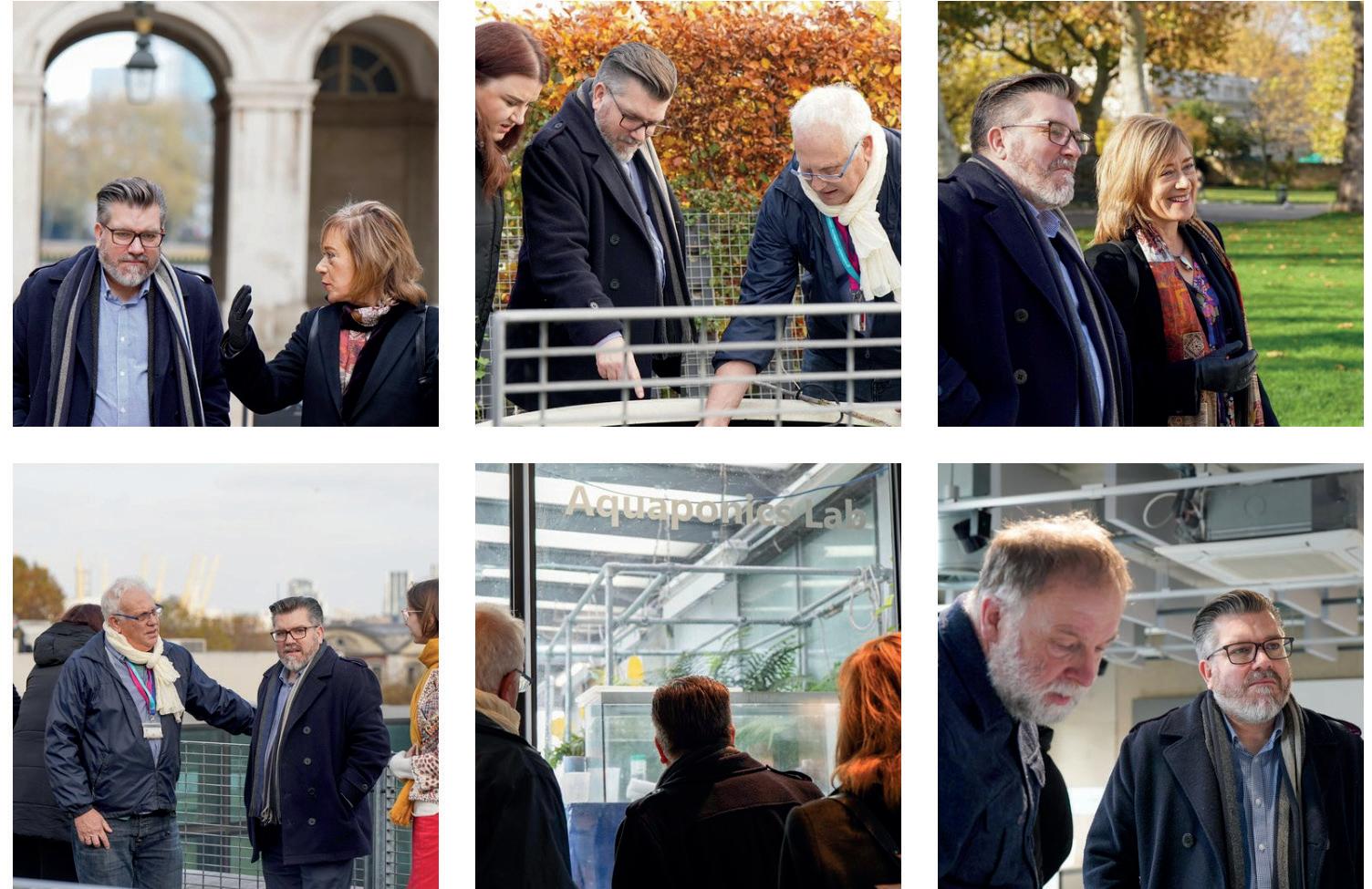
West Ham and Beckton
MP, James Asser, visited the University of Greenwich today to learn how this particular London university is leading the way in breaking down barriers to opportunity for its students, staff and the communities it serves.
Elected as an MP in July this year, James has previously played a prominent role in the Labour Party and as a local councillor and cabinet member in Newham.
The University of Greenwich has London-based campuses in Greenwich and Eltham and a Kent-based campus in Medway.
Most of its students are from the local area and nearly 60 per cent come from deprived areas. It has a strong track record of supporting underrepresented groupstwo thirds are Black, Asian or another ethnic minority background.

Most students are the first in their family to go to university, with many taking a non-traditional route to get there rather than the conventional A-Levels straight to degree course way.
Mr Asser was welcomed by the University of Greenwich’s Vice-Chancellor, Professor Jane Harrington, who gave him a tour of its iconic site in Greenwich where she highlighted its innovative work on sustainability, research and entrepreneurship. He also met staff and students to hear how the University’s approach to breaking down barriers to opportunity is making a difference.
Welcoming the opportunity to see the University’s work firsthand, James Asser, MP for West Ham and Beckton, said: “Thank you for the opportunity to tour the University of Greenwich to learn about all the fantastic work of the students and the University.
“Good quality and accessible education are vital for the country and economy. It was particularly good to hear about the University of Greenwich’s work in providing access to high-quality education for students in my constituency and Southeast London more broadly.”
It was particularly good to hear about the University of Greenwich’s work in providing access to high-quality education for students in my constituency and Southeast London more broadly.
Professor Jane Harrington, Vice-Chancellor of the University of Greenwich, added:“ “We were delighted to welcome James Asser MP to the University of Greenwich today. It was great to showcase our work and discuss the important issues facing our sector and students. Mr Asser’s visit was a valuable opportunity for us to share our achievements in providing high-quality education, sustainability, and EDI. We are grateful for the time and interest shown.”

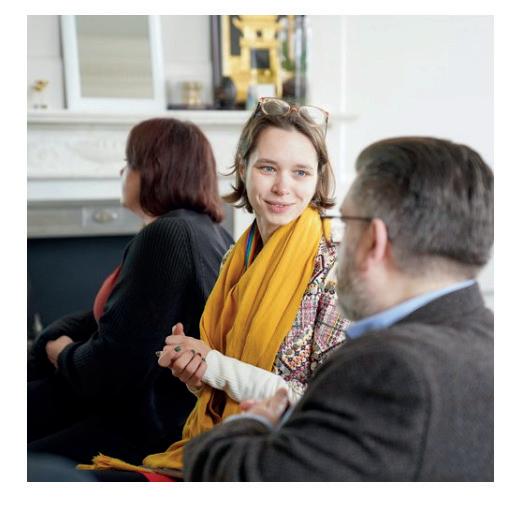
“It’s one thing to have sustainability and inclusion in your speeches and on the agenda, it’s another to be able to see them working in the buildings. It’s really amazing.”
Those were the words of Carla Martins, President of the Compostela Group of Universities: a global group of a little more than 60 institutions strong in Spain and Portugal but now sprinkled across South and Central America, much of Europe and even into Asia., during a visit to The University of Worcester, the only member in the UK.
The group formed in 1994 at the University of Santiago De Compostela in Spain to tackle the challenges facing higher education by sharing practices and facilitating collaboration between students and academics.
Along with the Executive Secretary of the CGU, Teresa Maria Caballeira, Carla Martins came to the University of Worcester to see what the institution was like in person, touring the campuses, meeting the staff and students, and finding out what Worcester is really like.
“One thing that is very clear to us is the care taken into transforming the facilities not only to be useful, but always with two things in mind: sustainability and inclusion,” she said. “Those pillars run through everywhere we’ve been and that’s unusual.”
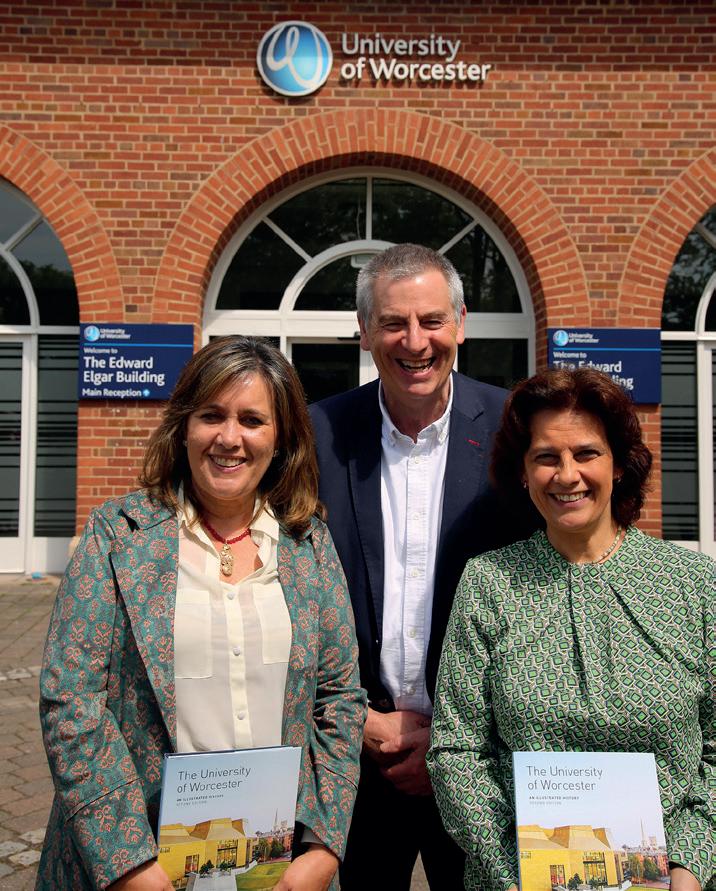
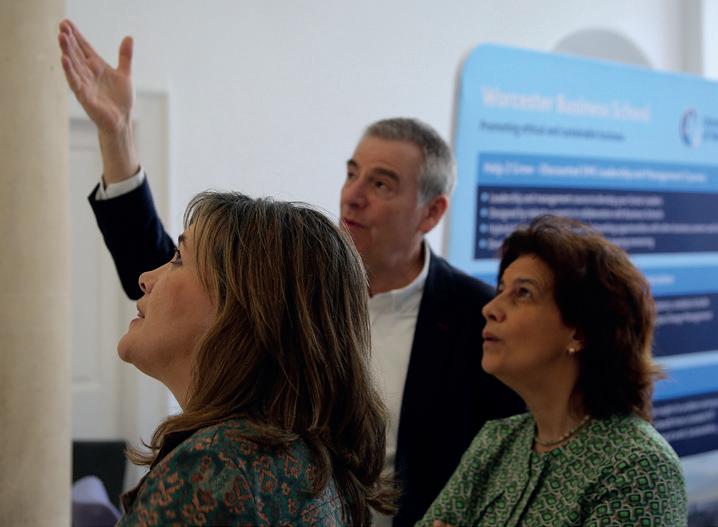
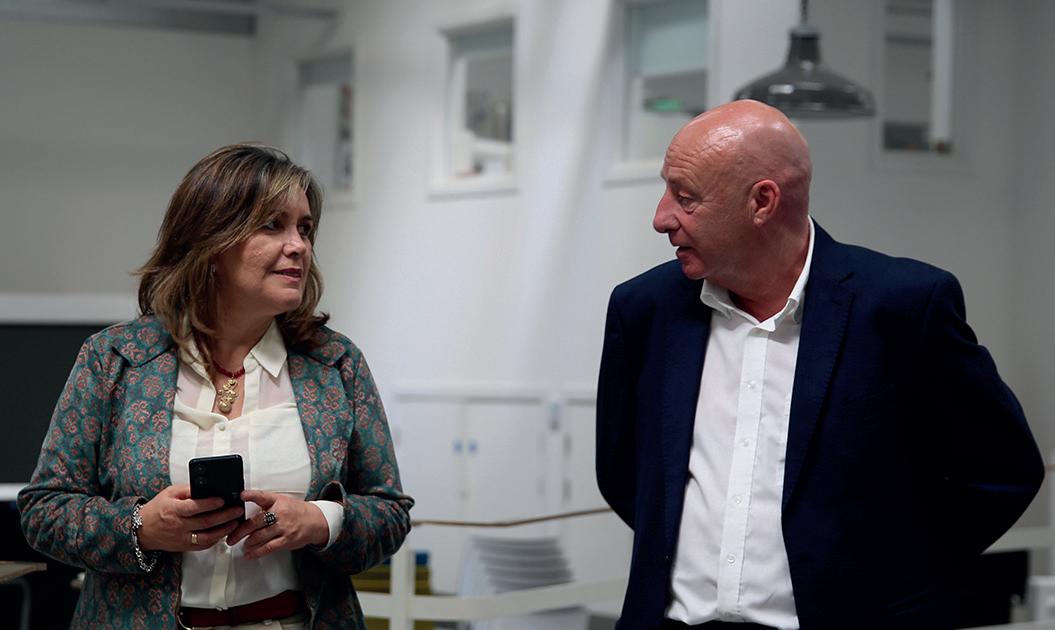
As part of their visit, they were shown the Art House. It was built as a car repairs workshop and sales room before it became a curtain shop, eventually being taken over by the University of Worcester and formally opened in 2019.
They were impressed by the inclusive design of the walkways, the moveable walls making it fit for the future and the use of the natural light.
“I’m really happy to see the University first hand,” said Carla. “It lives up to its promises here, and that’s very important.”
“Worcester’s profile in the Compostela has been rising,” she added. “Sustainability was very clear when the University presented its proposal to join the group, and I’d like them to be more visible to the whole network.”
The group facilitates the sharing of ideas around the world and encourages universities to look at the wider picture when it comes to the challenges they face. Recently, the CGU signed a collaboration agreement with an association representing 95 higher education institutions in Colombia to promote cooperation in research and teaching.
University of Worcester Vice Chancellor and Chief Executive, Professor David Green, CBE DL has been elected to be on the Executive of the Compostela Group. Worcester’s contribution to the group will be through helping other members in the area of sustainability.
“We joined the CGU because they have values which are very close to Worcester’s values,” he said. “Understanding different cultures, being on a journey together, the values of community and solidarity, as well as driving for understanding.”
Connected through the CGU, the benefits of sustainability and inclusion that students and staff see everyday at the University of Worcester can be shared from the western coast of Mexico to the centre of Georgia at the intersection of Europe and Asia.
Professor Green said: “Co-operation is very important. There’s lots of learning to be gained through working together, certainly in research and it’s also true for students and learning from other countries too.”

The project will bring together regional accountancy firms to look at how change can be achieved in the sector.
A new project has been launched to improve social mobility within the accountancy profession.
The Breaking Down Barriers to Accountancy project was launched by Chair of the Purpose Coalition and former Education Secretary Rt Hon Justine Greening, who is herself a trained accountant.
The project will bring together regional accountancy firms to look at how meaningful change can be achieved across the profession. Participating firms will take part in a series of workshops which will focus on outreach, access, recruitment and progression.
At the culmination of these sessions, an action plan will be produced featuring analysis of the challenges faced by the accountancy sector, as well as case studies of best practice. It will also include a comprehensive set of recommendations for the sector and accountancy firms to boost social mobility and widen diversity and inclusion, all aligned with the four key themes.
The Breaking Down Barriers to Accountancy action plan will be launched at an event in Parliament in the first part of 2025 which will bring together accountancy firms, education institutions, wider stakeholders and policymakers.
Speaking at the launch of the project, Chair of the Purpose Coalition and former Education Secretary, Rt Hon Justine Greening, said:
“This is a sector that turbocharged my career and really opened doors to opportunities – crucial for someone like me from a working-class background. More than that, the skills I learnt were ones I used every single day as a Secretary of State. But I am also aware of some of the barriers that still exist in both getting into the profession and how to progress. It means the sector is still missing out on some amazing talent and that’s what we want to work together to address.
“Many accountancy firms are already doing great work to break down barriers to opportunity and as part of this project we will be celebrating this best practice, sharing it and, importantly, exploring how to apply it more widely. Taking the lead from a new Government, society now has a much higher expectation of how businesses should operate and how they can demonstrate their wider social impact. I am looking forward to getting started on this new project and working with our partner firms to develop a strategic and countrywide approach to embedding social mobility in the accountancy sector.”
Participating accountancy firms include Dains, James Cowper Kreston, Rouse Partners, Crowe UK, AAB, Saffery, Forvis Mazars, Albert Goodman, haysmacintyre, Gerald Edelman and Price Bailey.

